Home ➔ How to Write an Essay ➔ Words to Use in an Essay ➔ Sentence Starters

Sentence Starters for Essays
A sentence starter is simply a word or a phrase that will help you to get your sentence going when you feel stuck, and it can be helpful in many different situations. A good sentence starter can help you better transition from one paragraph to another or connect two ideas. If not started correctly, your sentence will likely sound choppy, and your reader might not be able to follow your thoughts.
Below, we will explain when sentence starters for essays are used and what types of them exist. We will then give you plenty of examples of sentence-starter words and phrases that you can use in your writing.
Note: To learn more about word choice in academic writing, you can read our guide: Words to Use in an Essay
Why you need good sentence starters
In academic writing, sentence starters are usually used to connect one idea to another. Sentence starters make your essay coherent as they are often used to transition from one paragraph to another. In other words, they glue your writing together so that it makes sense and is easy to read.
You can also use sentence starters inside paragraphs. This will help you to better transition from one idea to another. It can make your writing flow better and sound more unified if done correctly.
When sentence starters are used
You don’t have to use them in every sentence, but they can be helpful if you feel like your ideas are choppy or you want to connect two thoughts. If overused, sentence starters can make your writing sound repetitive and distracting to the reader.
Here’s a list of cases where you should consider using sentence starters:
- To transition from one paragraph or section of your writing to another
- To introduce a new idea at the start of your essay or paragraph
- To start the final paragraph and conclude the entire essay
- To emphasize something important
- To create a hook and grab your reader’s attention
- To clarify something or give brief background information
These are just some common situations for using sentence starters, and this list is not definitive. If you can’t decide whether or not to use a sentence starter, it’s usually best to err on the side of not using one. If your paragraph flows nicely, don’t overthink it and move on with your essay writing .
What are the different types of sentence starters?
Sentence starters vary based on what you want to achieve in the sentence you’re starting. Here are some of the most common purposes that define what sentence starter you need to apply, along with some examples.
Starters for hooks
If you want to grab your reader’s attention in the first paragraph and make them want to read your essay, you need to use introduction sentence starters that are attention-grabbing and interesting. Some common sentence starters for essay hooks are:
- Did you know that… (for a fact)
- When I was… (for an anecdote)
- Just as… (for an analogy)
- According to… (for a statistic)
Starters to start a thesis statement
The thesis statement is the main idea of your essay. It’s what you want to prove or argue in your essay. You will need to use sentence starters that introduce your essay topic in a clear and concise way. For example:
- This essay will discuss…
- The purpose of this essay is to…
- In this essay, I will argue that…
- In my opinion…
- I think that…
Starters for topic sentences
A topic sentence is the first sentence at the beginning of each body paragraph that introduces the main idea of the paragraph. You will want to use body paragraph starters that state the main idea of the paragraph in a clear and concise way. Some specific examples:
- One reason why…
- The most important thing to remember is that…
- Another important factor to consider is…
- The first thing to note is that…
- It’s important to remember that…
- Besides the previous point,…
Starters for concluding
When you’re concluding your essay , you need to use conclusion sentence starters that emphasize the main points of your argument and leave your reader with a strong impression. Here are some examples:
- In conclusion,…
- To sum up,…
- Overall,…
- To conclude,…
- Finally,…
- In the final analysis,…
Starters for lists
If you’re listing ideas or items, you will want to use sentence starters that introduce each item clearly. Some common list starters are:
- The first…
- The second…
- Thirdly,…
- Next,…
- Lastly,…
Starters for comparing and contrasting
If you’re writing an essay that compares and contrasts two or more things, you will need to use sentence starters that introduce each item you’re discussing and emphasize the similarities and/or differences. For example:
- Similarly,…
- However,…
- In contrast to…
- On the other hand,…
- Compared to…
- Despite the fact that…
Starters for elaborating
If you want to elaborate on an idea, you need to use sentence starters that introduce the detail you’re going to include and how it relates to the main idea. Some common starters for elaborating are:
- For example,…
- In other words,…
- That is to say,…
- To elaborate,…
- Another way to put it would be…
- To put it more simply,…
Starters for giving background information
If you want to give some brief background information in your essay, you need to use sentence starters that introduce the information and explain why it’s relevant. For example:
- As previously mentioned,…
- As everyone knows,…
- In today’s society,…
Starters for giving an example
If you want to give an example in your essay, you need to use sentence starters that introduce the example and explain how it supports your argument. For example:
- For instance,…
- To illustrate,…
- Thus,…
- In this case,…
Starters for introducing a quotation
If you want to include a quotation in your essay, you need to use sentence starters that introduce the quotation and explain its relevance. Some examples:
- As John Doe said,…
- According to Jane Doe,…
- As the old saying goes,…
- In Jane Doe’s words,…
- To put it another way,…
Starters for introducing evidence
If you want to include evidence in your essay, you need to use sentence starters that introduce the evidence and explain its relevance. For example:
- The data shows that…
- This proves that…
- This suggests that…
- The evidence indicates that…
Starters for bridging
If you want to create a bridge sentence between two paragraphs, you need to use sentence starters that introduce the second paragraph and explain how it relates to the first. For example:
- This leads to the question,…
- This raises the issue,…
- Another important point to consider is…
- This brings us to the question of…
Starters to show causation
If you want to show causation in your essay, you need to use sentence starters that introduce the cause and explain its relationship to the effect. For example:
- Because of this,…
- As a result,…
- Consequently,…
- Due to the fact that…
- Therefore,…
Starters to emphasize a point
If you want to emphasize a point in your essay, you need to use sentence starters that draw attention to the point and make it clear why it’s important. Examples of sentence starters to add emphasis:
- Importantly,…
- Significantly,…
Starters to express doubt
If you want to express doubt about an idea in your essay, you need to use sentence starters that make it clear you’re not certain and explain why you have doubts. For example:
- It’s possible that…
- It’s uncertain whether…
- Some people might argue that…
- There is evidence to suggest that…
- Although it is debatable,…
- It might be the case that…

Key takeaways
- Sentence starters are especially important in academic writing because they can help you make complex arguments and express yourself clearly.
- There are many different types of sentence starters, each with its own purpose.
- You need to choose the right sentence starter for the specific task you’re writing about.
- When in doubt, err on the side of caution and choose a simpler sentence starter.
Now that you know the different types of sentence starters and how to use them effectively, you’ll be able to write clear, concise, and well-organized essays.
Was this article helpful?
- Features for Creative Writers
- Features for Work
- Features for Higher Education
- Features for Teachers
- Features for Non-Native Speakers
- Learn Blog Grammar Guide Community Events FAQ
- Grammar Guide
Sentence Starters: Ultimate List to Improve Your Essays and Writing

Ashley Shaw
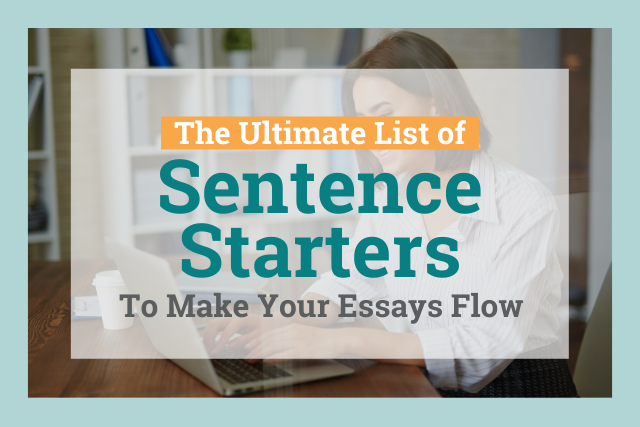
This blog post is going to be about … No. Too boring.
Today, I am going to talk to you about ... No. Too specific.
This is a blog post for all writers ... Nope. Too generic.
Has this ever been you while writing? I get it. Writing a good sentence can be hard, and when you have to string a whole lot of them together, the task can become daunting. So what do you do?
From the first sentence you write to the very last, you want each one to show your style and motivate your reader to keep reading. In this post, we are going to think about how you start your sentences.
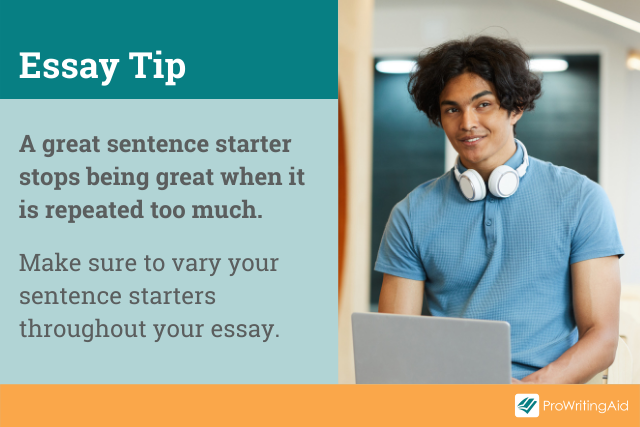
What Is a Good Sentence Starter for an Essay Introduction?
What is a good sentence starter for a body paragraph, 25 useful transitions, can i repeat a sentence starter, how can i rephrase "in conclusion".
The first paragraph of a paper can make or break your grade. It is what gets your audience into the topic and sets the whole stage. Because of this, it is important to get your readers hooked early.
The first sentence of a paper is often called the hook. It shouldn’t be anything ordinary. It should have strong language and be a little surprising, with an interesting fact, story, statistic, or quote on the topic.
Because it is designed to pull the reader in and surprise them a little, it is often good to avoid pre-written sentence starter examples when writing your hook. Just get into it here, and worry about the flow later.
Here are some examples:
Spider webs were once used as bandages.
I taught myself to read when I was three. At least, that’s the story my parents tell.
Recent studies suggest that the average person lies at least once in every conversation.
“The world is bleeding and humans wield the knife,” or so says environmental scientist So Andso.
(P.S. Except for example 1, which is true, I just made all of these up to demonstrate my point. So, please don’t quote me on these!)
Once you jump right in with your hook, it is time to start working on ways to move sentences along. Here is where you may need some sentence starter examples.
In your first paragraph, you basically want to connect your hook to your thesis. You’ll do this with a few sentences setting up the stage for your topic and the claim you will make about it. To do that, follow the tips found in the next section on body paragraphs and general sentence starter tips.
Many of the tips I am about to discuss can be used anywhere in a paper, but they are especially helpful when writing body paragraphs.
Let’s start with one of the most important types of sentence starter in essay writing: transition words.
How Do I Use Transitions in an Essay?
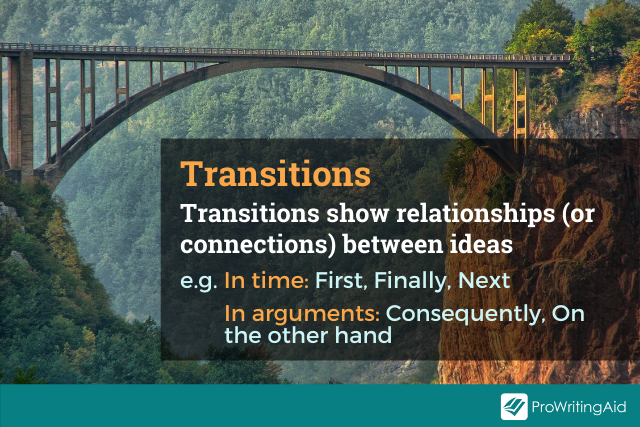
If you want to start writing terrific sentences (and improve your essay structure ), the first thing you should do is start using transition words.
Transition words are those words or phrases that help connect thoughts and ideas. They move one sentence or paragraph into another, and they make things feel less abrupt.
The good thing about transition words is that you probably know a lot of them already and currently use them in your speech. Now, you just need to transition them into your writing. (See what I did there?)
Before we get into examples of what a good transition word is, let’s look at a paragraph without any transitions:
I went to the store. I bought bacon and eggs. I saw someone I knew. I said hello. I went to the cashier. They checked me out. I paid. I got my groceries. I went to my car. I returned home.
Yikes! That is some boring writing. It was painful to write, and I am sure it is even worse to read. There are two reasons for this:
- I start every sentence with the same word (more on this later)
- There are no signposts showing me how the ideas in the paragraph connect.
In an essay, you need to show how each of your ideas relate to each other to build your argument. If you just make a series of statements one after the other, you’re not showing your instructor that you actually understand those statements, or your topic.
How do we fix this? Transition words. Roughly 25% of your sentences should start with a transition word. If you can hit that number in your essay, you’ll know that you’ve made meaningful steps towards demonstrating your understanding.
Of course, hitting that number isn’t enough—those transitions need to be meaningful. Let’s look at the different types of transitions and how you can use them.
What Are Words Like First , Next , and Last Called?
You probably already use some transitions in your essays. For example, if you start a paragraph with firstly , you’ve used a transition word. But transitions can do so much more!
Here are 25 common transitional words and phrases that you could use in your essay:
- Additionally / In Addition
- Alternatively / Conversely
- As a result of
- At this time
- Consequently
- Contrary to
- First(ly), Second(ly), etc.
- In contrast
- Nonetheless
- On the other hand
- Particularly / In particular
- In other words
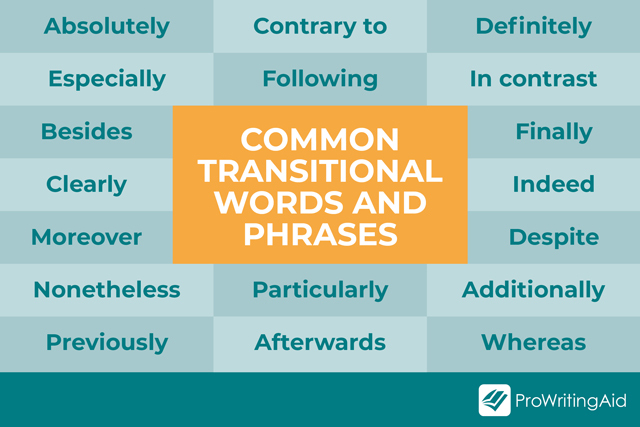
This list isn’t exhaustive, but it is a good start.
These words show different types of relationships between ideas. These relationships fall into four main categories: Emphasis , Contrast , Addition , and Order .
What Are Emphasis Transition Words?
These phrases are used when you want to highlight a point. Examples from my above list include clearly , particularly , and indeed . Want to see some more? Follow my bolded transitions: Undoubtedly , you understand now. It should be noted that you don’t need to worry.
How Do You Use Addition Transitions?
These words add on to what you just said. These are words like along with , moreover , and also . Here are some more: Not only are you going to be great at transitions after this, but you will also be good at writing sentences. Furthermore , everyone is excited to see what you have to say.
How Can I Use Transitions to Contrast Ideas?
This is the opposite of addition, and you use it when you want to show an alternative view or to compare things. Examples from my list include words like nonetheless , contrary to , and besides .
Here are some more: Unlike people who haven’t read this article, you are going to be really prepared to write great sentences. Even so , there is still a lot more about writing to learn.
How Do I Order Ideas in My Essay?
A good first step is using order transition words.
This set of transitions helps mark the passage of time or gives an order to events. From the list, think of things like first and finally . Now for some extras: At this time yesterday , you were worried about starting sentences. Following this , though, you will be an expert.
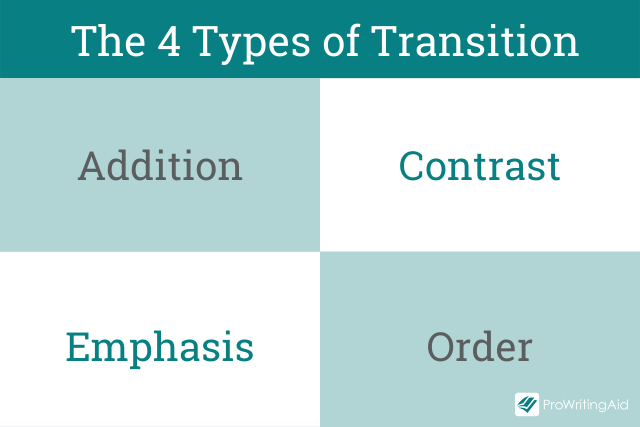
Now that you get the concept of transitions, let’s go back to that poorly written paragraph above and add some in to see what happens:
This morning , I went to the store. While I was there, I bought bacon and eggs. Then I saw someone I knew. So I said hello. After that , I went to the cashier. At that time , they checked me out. First , I paid. Next , I got my groceries. Following that , I went to my car. Finally , I returned home.
(Notice the use of commas after most of these transitions!)
This isn’t the best paragraph I’ve ever written. It still needs a lot of work. However, notice what a difference just adding transitions makes. This is something simple but effective you can start doing to make your sentences better today.
If you want to check your transition usage, try ProWritingAid’s Transitions report . You’ll see how many of each type of transition word you've used so you can pin-point where you might be losing your reader.
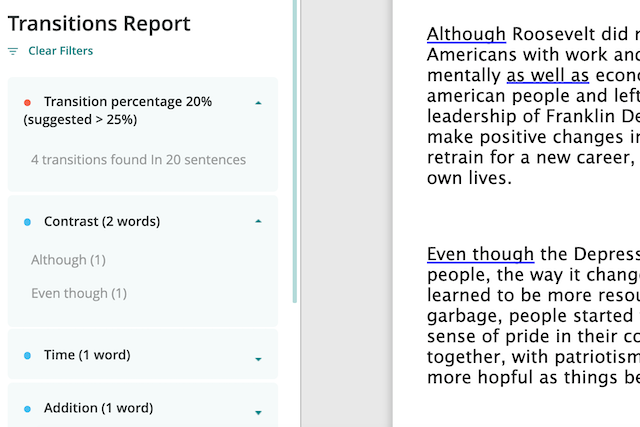
Sign up for a free ProWritingAid account to try it out.
What Are Some Linking Phrases I Can Use in My Essay?
As well as individual words, you can also use short phrases at the beginning of your sentences to transition between ideas. I just did it there— "As well as individual words" shows you how this section of the article is related to the last.
Here are some more phrases like this:
As shown in the example,
As a result of this,
After the meeting,
While this may be true,
Though researchers suggest X,
Before the war began,
Until we answer this question,
Since we cannot assume this to be true,
While some may claim Y,
Because we know that Z is true,
These short phrases are called dependent clauses . See how they all end with a comma? That's because they need you to add more information to make them into complete sentences.
- While some may claim that chocolate is bad for you, data from a recent study suggests that it may have untapped health benefits .
- Since we cannot assume that test conditions were consistent, it is impossible to reach a solid conclusion via this experiment .
- As a result of this, critics disagree as to the symbolism of the yellow car in The Great Gatsby .
The bolded text in each example could stand on its own as a complete sentence. However, if we take away the first part of each sentence, we lose our connection to the other ideas in the essay.
These phrases are called dependent clauses : they depend on you adding another statement to the sentence to complete them. When you use a sentence starter phrase like the ones above in your writing, you signal that the new idea you have introduced completes (or disrupts) the idea before it.
Note: While some very short dependent clauses don’t need a comma, most do. Since it is not wrong to use one on even short ones (depending on the style guide being used), it is a good idea to include one every time.
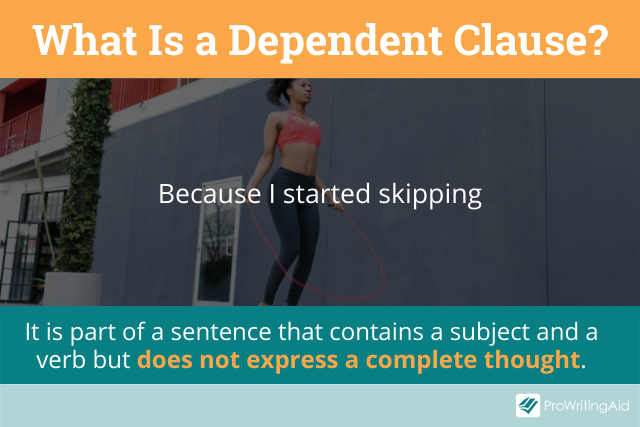
Along with missing transitions and repeating sentence structure, another thing that stops sentences from being great is too much repetition. Keep your sentences sharp and poignant by mixing up word choices to start your sentences.
You might start your sentence with a great word, but then you use that same word 17 sentences in a row. After the first couple, your sentences don’t sound as great. So, whether it is varying the transitional phrases you use or just mixing up the sentence openers in general, putting in some variety will only improve your sentences.
ProWritingAid lets you know if you’ve used the same word repeatedly at the start of your sentences so you can change it.
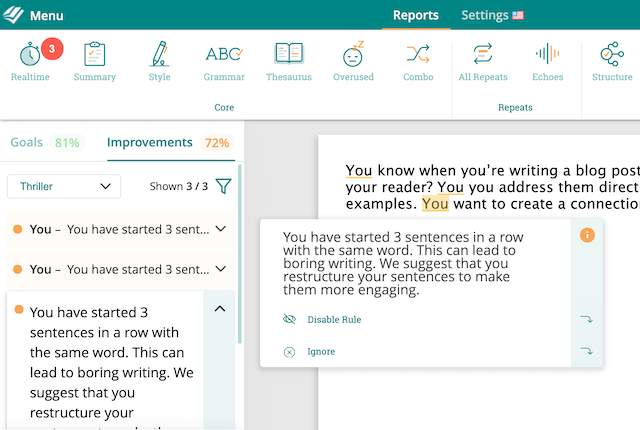
The Repeats Report also shows you all of the repeats in your document. If you've used a sentence starter and then repeated it a couple of paragraphs down, the report will highlight it for you.
Try the Repeats Report with a free ProWritingAid account.
Now that you have your introduction sentences and body sentences taken care of, let’s talk a little about conclusion sentences. While you will still use transitions and clauses as in the body, there are some special considerations here.
Your conclusion is what people will remember most after they finish reading your paper. So, you want to make it stand out. Don’t just repeat yourself; tell them what they should do with what you just told them!
Use the tips from above, but also remember the following:
Be unique. Not only should you vary the words you use to start different sentences, but you should also think outside of the box. If you use the same conclusion sentence starter everyone else is using, your ideas will blend in too.
Be natural. Some of the best writing out there is writing that sounds natural. This goes for academic writing, too. While you won’t use phrases like "at the end of the day" in essay writing, stilted phrases like "in conclusion" can disrupt the flow you’ve created earlier on.
Here are some alternatives to "in conclusion" you could use in an essay:
- To review, ... (best for scientific papers where you need to restate your key points before making your final statement)
- As has been shown, ...
- In the final analysis, ...
- Taking everything into account, ...
- On the whole, ...
- Generally speaking, ...
If you’re looking for more ways to rephrase "in conclusion," take a look at our complete list of synonyms you can use.
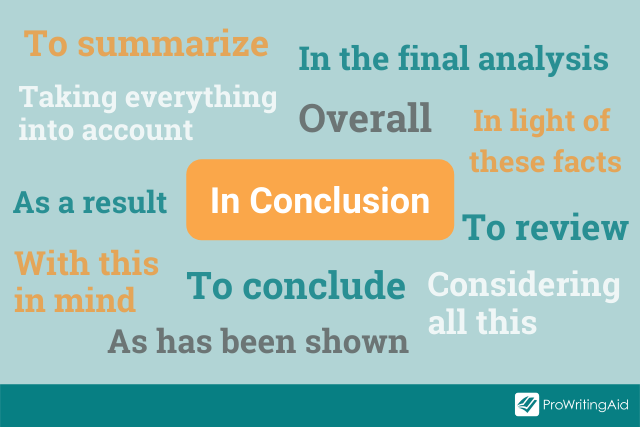
There may not be a set word or words that you can use to make your sentences perfect. However, when you start using these tips, you’ll start to see noticeable improvement in your writing.
If you’ve ever heard people talk about pacing and flow in academic writing, and you have no idea what they mean or how to improve yours, then this is your answer. These tips will help your writing sound more natural, which is how you help your ideas flow.
Take your writing to the next level:

20 Editing Tips from Professional Writers
Whether you are writing a novel, essay, article, or email, good writing is an essential part of communicating your ideas., this guide contains the 20 most important writing tips and techniques from a wide range of professional writers..

Be confident about grammar
Check every email, essay, or story for grammar mistakes. Fix them before you press send.
Ashley Shaw is a former editor and marketer/current PhD student and teacher. When she isn't studying con artists for her dissertation, she's thinking of new ways to help college students better understand and love the writing process.
Get started with ProWritingAid
Drop us a line or let's stay in touch via :
Crafting Compelling Sentence Starters for Essays

Welcome to our comprehensive guide on mastering sentence starters for essays. Ever wondered how some writers effortlessly hook their readers from the first line, smoothly transition between ideas, and leave a lasting impression?
The secret lies in the artful use of sentence starters. These short phrases are more than just transition words; they're the key to making your paper engaging, coherent, and sophisticated.
In this blog post, we'll shed light on the importance of good sentence starters, provide examples, and guide you on how to use them effectively in different parts of your essay. Whether you're writing an introduction, body paragraph, or conclusion , we've got you covered. But that's not all.
We'll also delve into common mistakes to avoid when using sentence starters and how to adapt them for different types of essays. So, buckle up and get ready to elevate your essay writing skills to new heights. Let's get started!
Understanding the Importance of Good Sentence Starters
Whether you're crafting an academic text or writing a blog , the right sentence starter can make all the difference. It's not just about stringing words together; it's about choosing the right words that will hook the reader and keep them engaged. So, let's delve deeper into understanding the importance of good sentence starters and how they can elevate your writing.
Why Good Sentence Starters are Crucial for Your Writing
Good sentence starters are the backbone of compelling writing. They act as the gateway to your thoughts, guiding the reader through your narrative or argument. They're not just a fancy academic phrase or a tool to meet a word count. They're the key to making your writing flow, to connecting your ideas, and to keeping your reader engaged.
Imagine reading a text that jumps from one point to another without any clear transitions. It would be like trying to follow a map without any signposts. You'd likely get lost, frustrated, and give up. That's exactly what happens when you don't use sentence starters. Your readers can't follow your train of thought, and they lose interest.
When you use sentence starters effectively, you're laying out a clear path for your reader. You're telling them, "Pay attention, this is an important point," or "Here's a contrasting view," or "Let's move on to a new idea." You're hooking the reader, keeping them engaged, and making your writing more impactful.
Examples of Effective Sentence Starters
Here are some examples of effective sentence starters that can elevate your writing:
- "Despite the common belief, ..."
- "Drawing from the data, ..."
- "Contrary to what one might think, ..."
- "Given the circumstances, ..."
- "Taking into account the evidence, ..."
- "As a matter of fact, ..."
- "In light of recent events, ..."
- "Considering the implications, ..."
- "Reflecting on the situation, ..."
- "From a different perspective, ..."
These sentence starters are not just words or phrases; they are the hooks that grab your reader's attention. They are the bridges that connect your thoughts and ideas, making your academic text more coherent and engaging. So, the next time you sit down to write, pay close attention to your sentence starters. They might just be the key to taking your writing to the next level.
Try for free
Plan, write and optimize SEO content
Sign up today for a free trial, and you'll have access to 5000 words and 300 bonus credits—completely free.

Sentence Starters for Essay Introductions
In this section, we will explore how to use sentence starters effectively in essay introductions, providing you with practical tips and examples.
How to Use Sentence Starters in Essay Introductions
The art of crafting an engaging essay introduction lies in the strategic use of sentence starters. These are not just any random words, but carefully chosen transition words, short phrases, or clauses that guide the reader into the narrative. They serve as a bridge, connecting the title to the body of the essay, and setting the tone for what's to come.
To use a sentence starter effectively, you need to understand its purpose. It's not just about starting a sentence; it's about creating a smooth transition that guides the reader from one idea to the next. It's about shedding light on the purpose of your research, and preparing the reader for the arguments you're about to present.
The goal is to make your paper as readable and engaging as possible. So, don't overuse sentence starters. Use them sparingly, and only when necessary to enhance the clarity and coherence of your essay.
Examples of Sentence Starters for Essay Introductions
Here are some examples of sentence starters that can be used in essay introductions:
- "The purpose of this research is to..."
- "This essay will shed light on..."
- "In answer to the top question..."
- "To paraphrase the research findings..."
- "The essay introduction starters are designed to..."
- "Using a sentence starter, we can..."
- "With the use of transition words, we can..."
- "A short phrase can make your paper more engaging..."
- "Here's a starter example to illustrate..."
- "This sentence starter example will clarify..."
These starters not only grab the reader's attention but also provide a clear roadmap for the essay. They can be used to introduce a new argument, create a smooth transition between paragraphs, or emphasize key ideas. Remember, the goal is to make your writing more compelling and engaging for the reader.
Sentence Starters for Body Paragraphs
Understanding how to use these paragraph starters effectively is crucial in crafting a well-structured essay. They not only introduce new ideas but also create a seamless connection between the previous and the upcoming content.
How to Use Sentence Starters in Body Paragraphs
In essay writing, sentence starters for essays are the secret sauce that adds flavor to your content. They are the transition phrases that guide your reader from one idea to the next, ensuring a smooth journey through your thoughts. When it comes to body paragraphs, these starters play a pivotal role in maintaining the flow and coherence of your essay.
A good paragraph starter doesn't just introduce the next idea, it also ties in with the previous one. It's a bridge that connects the two, making your paper feel like a cohesive whole rather than a collection of disjointed thoughts. So, when you start a body paragraph, consider the content of the previous one and choose a transition that will smoothly carry your reader forward.
Sentence Starters for Essay Conclusions
Wrapping up an essay or research paper with a strong conclusion is just as important as having a compelling introduction. The conclusion is your final chance to leave a lasting impression on your reader, and using the right sentence starters can make all the difference.
These conclusion sentence starters not only help you summarize your findings but also add a touch of sophistication to your writing. They serve as a bridge, connecting your final thoughts and the main body of your work, ensuring a smooth transition that enhances the overall readability of your paper.
Whether you're looking to paraphrase research findings or shed light on the broader implications of your work, the right sentence starter can help you achieve your goal. So, let's delve into the art of using sentence starters for essay conclusions.
How to Use Sentence Starters in Essay Conclusions
When it comes to wrapping up your research paper or essay, the use of conclusion sentence starters can be a game-changer. These short phrases or transition words can help you summarize your findings, restate your thesis, and leave a lasting impression on your reader.
The key to using these sentence starters effectively is to use them sparingly. Overuse can make your paper sound repetitive and unprofessional. Instead, use them to introduce a new idea or to transition smoothly between thoughts.
Another effective way to use a sentence starter is to highlight something important. A well-placed sentence starter can draw the reader's attention to a key point or finding in your research.
Examples of Sentence Starters for Essay Conclusions
Here are some examples of conclusion sentence starters that can be used to wrap up your research paper or essay:
- "In conclusion, it is evident that..." This starter is a classic way to summarize your findings. For instance, "In conclusion, it is evident that the purpose of this research was to shed light on the effects of climate change."
- "Based on the findings, it can be concluded that..." This phrase is perfect for emphasizing the results of your research. For example, "Based on the findings, it can be concluded that regular exercise contributes to improved mental health."
- "Overall, this research sheds light on..." This sentence starter is great for highlighting the broader implications of your work. For instance, "Overall, this research sheds light on the importance of early intervention in education."
The use of a sentence starter or transition word can make your paper more coherent and impactful.
Sentence Starters for Different Types of Essays
Let's explore the specifics of using sentence starters in different types of essays. Whether you're crafting an argumentative, descriptive, or narrative essay, we'll provide you with a starter example to shed light on how to make your paper more compelling. Let's dive in!
Sentence Starters for Argumentative Essays
- "Despite the prevailing belief, I argue that..."
- "The evidence strongly suggests that..."
- "To shed light on this issue, consider the following..."
- "The purpose of this research is to challenge the notion that..."
- "One cannot ignore the fact that..."
- "Drawing upon the data, it becomes clear that..."
- "This argument is further strengthened by the fact that..."
- "In response to this argument, one might assert that..."
- "The crux of the matter is that..."
- "This line of reasoning leads us to conclude that..."
- "In the face of such compelling evidence, it is hard to dispute that..."
Sentence Starters for Descriptive Essays
Here are some sentence starters that can be effectively used in descriptive essays:
- "As I stepped into the room, ..."
- "The first thing that caught my eye was ..."
- "I was immediately struck by ..."
- "The sight that greeted me was ..."
- "I couldn't help but notice ..."
- "The aroma of ... filled the air."
- "The sound of ... echoed in the distance."
- "The taste of ... lingered on my tongue."
- "The touch of ... sent shivers down my spine."
- "The feeling of ... was overwhelming."
These sentence starters can help you set the scene and engage your reader's senses right from the start. Remember, the purpose of a descriptive essay is to paint a vivid picture in the reader's mind. Using these sentence starters can help you achieve that.
Sentence Starters for Narrative Essays
- Setting the Scene : "The sun was setting, casting long shadows across the park as children's laughter echoed in the distance..."
- Introducing a Character : "Meet John, a man of few words but with a story that could fill volumes..."
- Creating Suspense : "As she turned the corner, her heart pounded in her chest, not knowing what she would find..."
- Describing an Event : "The concert was a whirlwind of lights, music, and energy that swept everyone off their feet..."
- Presenting Dialogue : "'I've never seen anything like it,' he whispered, his eyes wide with awe and wonder..."
- Sharing an Inner Thought : "She couldn't help but wonder if this was the right decision, if she was on the right path..."
- Ending with a Cliffhanger : "As the door slowly creaked open, he braced himself for what was to come..."
Common Mistakes to Avoid When Using Sentence Starters
It's not just about knowing a variety of good sentence starters, but also about knowing when and how to use them to hook the reader and emphasize important points. Let's explore these common mistakes and learn how to avoid them.
Overusing the Same Sentence Starters
One of the most common pitfalls when using sentence starters is overusing the same phrase or word. It's like a song on repeat; after a while, it loses its charm. This is especially true in academic texts, where the goal is to hook the reader and keep them engaged.
A good sentence starter can be a great way to introduce a new idea or point. However, if you use the same starter example repeatedly, it can make your writing sound monotonous and uninteresting. It's important to pay attention to this as it can detract from the important points you're trying to make.
Remember, variety is the spice of life, and this holds true for sentence starters as well. Mixing up your sentence starters not only makes your writing more engaging but also helps to maintain the reader's interest.
So, the next time you write, be mindful of the sentence starters you use. Try to incorporate different ones to keep your writing fresh and engaging. This is a great way to ensure that your writing is always at its best.
Using Inappropriate Sentence Starters
One of the most common mistakes that writers make is using inappropriate sentence starters. This usually happens when the writer is not fully aware of the context or the tone of the text. For instance, using a casual sentence starter in an academic text can disrupt the flow and confuse the reader.
It's important to pay attention to the type of text you're writing. If it's an academic paper, using academic phrases as sentence starters is a great way to maintain the formal tone. On the other hand, if you're writing a blog post or a novel, you might want to use more casual or creative sentence starters to hook the reader.
Another important point to remember is that not all sentence starters are suitable for all types of sentences. For example, using a contrasting sentence starter in a sentence that's supposed to add information can lead to misunderstandings.
Final Thoughts on Mastering Sentence Starters for Essays
Mastering the use of sentence starters is a crucial skill for any writer. These transition words and phrases serve as bridges, guiding your reader through your thoughts and arguments. They not only enhance the flow and coherence of your writing but also hook the reader's attention, making your work more engaging and compelling.
However, remember that the effective use of sentence starters requires balance.
Overuse can lead to redundancy, while inappropriate use can confuse your reader. Therefore, it's essential to understand the context and purpose of each sentence starter to use it appropriately.
In the end, the art of using sentence starters is about making your paper more readable and persuasive. So, keep practicing, and soon, you'll find that these handy tools have become an integral part of your writing toolkit.
If you need professional writing help , try Strategically AI for free today.

How to Add a Description to Your Shopify Collection Pages

Rebecca Hey
3 July 2024

How to See How Many Products You Have on Shopify
1 July 2024

SEO for Product Descriptions: Boost Your Sales and Visibility

How to Bulk Edit Products on Shopify
28 June 2024

How to change collection URL in Shopify
24 June 2024

How to Create a Sub-Collection in Shopify
21 June 2024

Sentence Starters: Definition, Rules and Remarkable Examples
Sentence starters, also known as transition words or phrases, are vital tools for essay writing. They play a key role in formulating an interesting and well-written introduction, providing smooth transitions between sentences and paragraphs, and writing a proper conclusion that summarizes the main points covered. Sentence starters are one of the essential tools of a skilled writer.
Table of Contents
What Are Sentence Starters and Why Are They So Important?
The main function of sentence starters is to tie together words, sentences, and paragraphs in an essay so that the writing flows logically. The sentence starters will help the readers comprehend the content more easily and absorb the meaning. The writing will be well-organized and cohesive.
Reading an essay containing well-placed and thoughtful sentence starters will be much easier, more interesting, and far less tedious. Most readers will be comfortable reading the material and will understand the writer’s intent. Students who use sentence starters expertly can expect to receive higher grades on their essays and exams.
What Are Some Examples of Sentence Starters?
Sentence starters for introductions.
- This essay discusses…
- The definition of…
- In my opinion…
- A popular subject of debate lately has been…
- Until now, I believed…, then I found out that…
- Most people assume that…
- The most recent data suggests that…
- A popular topic for discussion recently has been…
- Recent headlines have shown…
Sentence Starters for Transitioning Between Sentences and Paragraphs
- In contrast,
- Furthermore,
- In addition,
- On the other hand ,
- Consequently,
- As a result,
- Additionally,
- Even though,
Examples of Sentence Starters Used in Sentences
In contrast , Representative Smith supported the new bill enthusiastically.
Moreover , data from a follow-up study found an even better outcome for patients who used this treatment.
Furthermore , other researchers had similar promising results.
Similarly , Dr. John Blake, Professor of Political Science at Stanford University, agreed with Dr. Johnson’s findings.
While the news was positive, experts were cautious about becoming overly optimistic at this point.
On the other hand , the lead engineer, Edward Boswell, disagreed with the proposed remodeling plans.
Although Rachel Turner was against the tentative schedule, she compromised with the rest of the committee .
Whereas Fairfield amended its town ordinance, Weston decided to postpone the action indefinitely.
Sentence Starters for Conclusions
- In summary,
- In closing,
- Ultimately,
- In the final analysis,
- In essence,
- All in all,
Examples of Sentence Starters in Conclusions
- In summary , this analysis shows promising possibilities for new treatments and better outcomes.
- In closing , there are substantive arguments on both sides of the issue. However, I believe that passing this legislation would be the best course of action.
- To sum up , there needs to be more extensive research on these proposals in order to make a sound decision.
- Ultimately , the voters will decide whether the downtown transformation is in the best interests of the city.
- In the final analysis , I believe that Morgan’s proposal is the most promising.
- In essence , Dr. Jackson is advocating for increased spending now which will compromise the town’s future goals.
- All in all , it seems that the proponents of the project have more evidence than does the opposition.
Sentence Starters | Infographic


Sentence Starters: Useful Words and Phrases You Can Use As Sentence Starters
Posted on Last updated: October 24, 2023

Sharing is caring!
Sentence Starters! Here you will find a useful list of common sentence starters that you can use in a discussion as well as in essay writing. Learn these sentence starters to improve your English speaking and writing skills.
Table of Contents
Sentence Starters
Sentence starters | common phrases.
- (The topic) has fostered a debate on …
- A sensible idea would be to…
- We all know that…
- It is said that…
- It is believed that…
- People assumed that…
- There is growing support for the notion that …
- The data gathered in the study strongly suggests that …
- The supposition drawn from this being that…
- Leading to the supposition that…
- This can be argued that..
- The source suggest…
- My own feeling on the subject is that …
- Generally speaking…
- As far as I know…
- As far as I am concerned…
- I believe that…
- The focus of discussion in this paper is …
- The premise of (the topic) seems to be based on …
- Latest research corroborates the view that …
- Most people would agree that…
- It is estimated…
- The reader supposed that…
- It is clear that…
- Everybody knows that…
- Surely you would agree that…
- This clearly shows that…
- I discovered…
- We always…
- This indicates…
- Demonstrating that…
- It is vital that…
- It wouldn’t be very difficult to…
- The real truth is that…
- Are we expected that…
- The fact is that…
- I felt as…
- I think/ I believe that…
- It seems to me that…
- We concluded that…
- My perspective is…
- I agree with…
- Have you thought about…
- In other words…
- I see what you mean but…
- I share your point of view on…
- In my opinion…
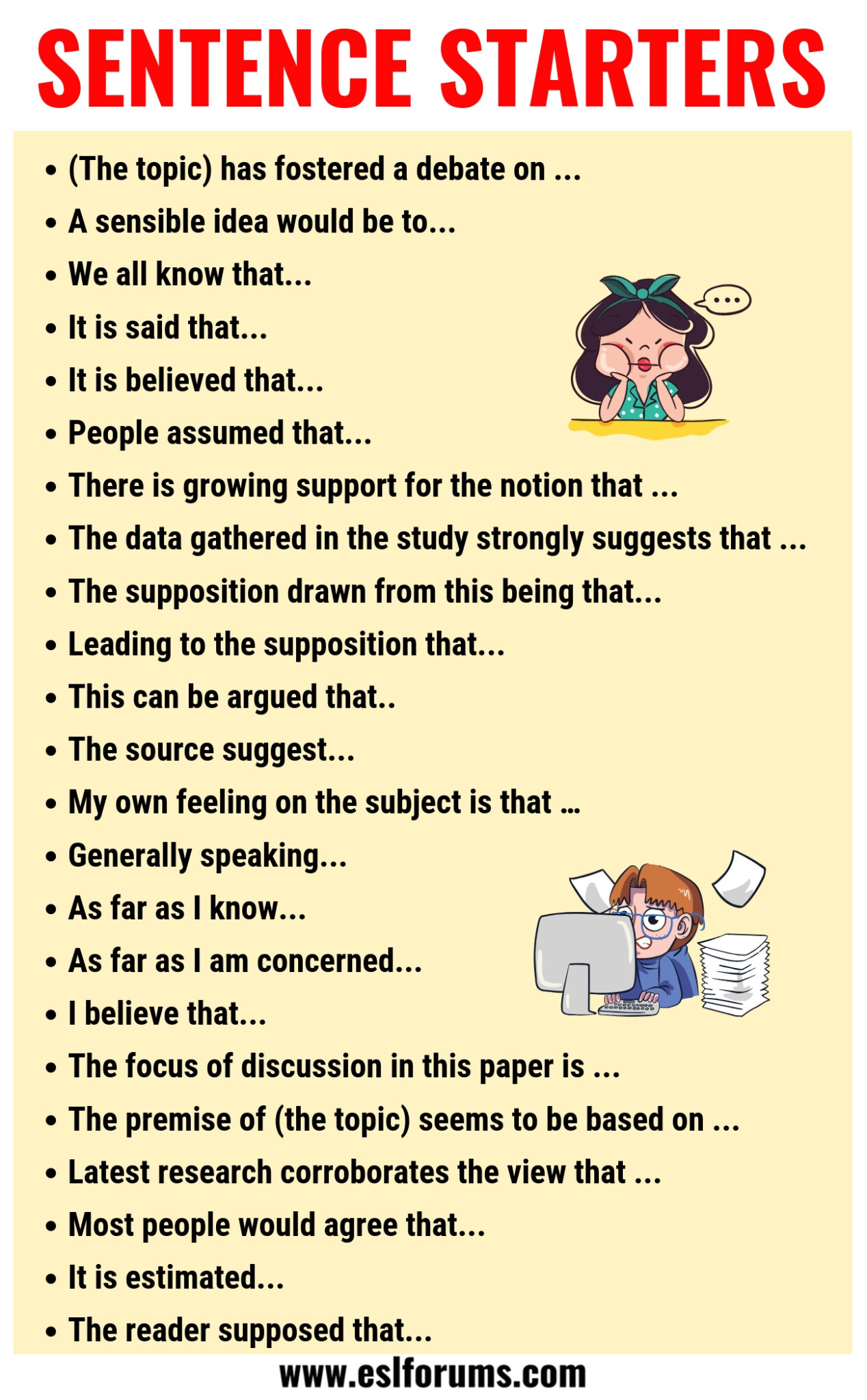
Transition Words Used as Sentence Starters
Words to add an idea
- In addition to
- For instance
- For example
- As an example
- Additionally
- Furthermore
- Another reason
- Coupled with
- Correspondingly
- In addition
- Identically
- One other thing
Words that show cause
- Accordingly
- As a result
- Consequently
- For this reason
- For this purpose
- Subsequently
- This is why
- Following this
- As you can see
- For all of those reasons
Words that show contrast
- Comparatively
- Different from
- Even though
- However ( however synonyms )
- In comparison
- Nevertheless
- In contrast
- On the one hand…
- On the other hand
- On the contrary
Words that add emphasis
- Generally speaking
- For the most part
- In this situation
- No doubt (undoubtedly)
- Particularly
- Unquestionably
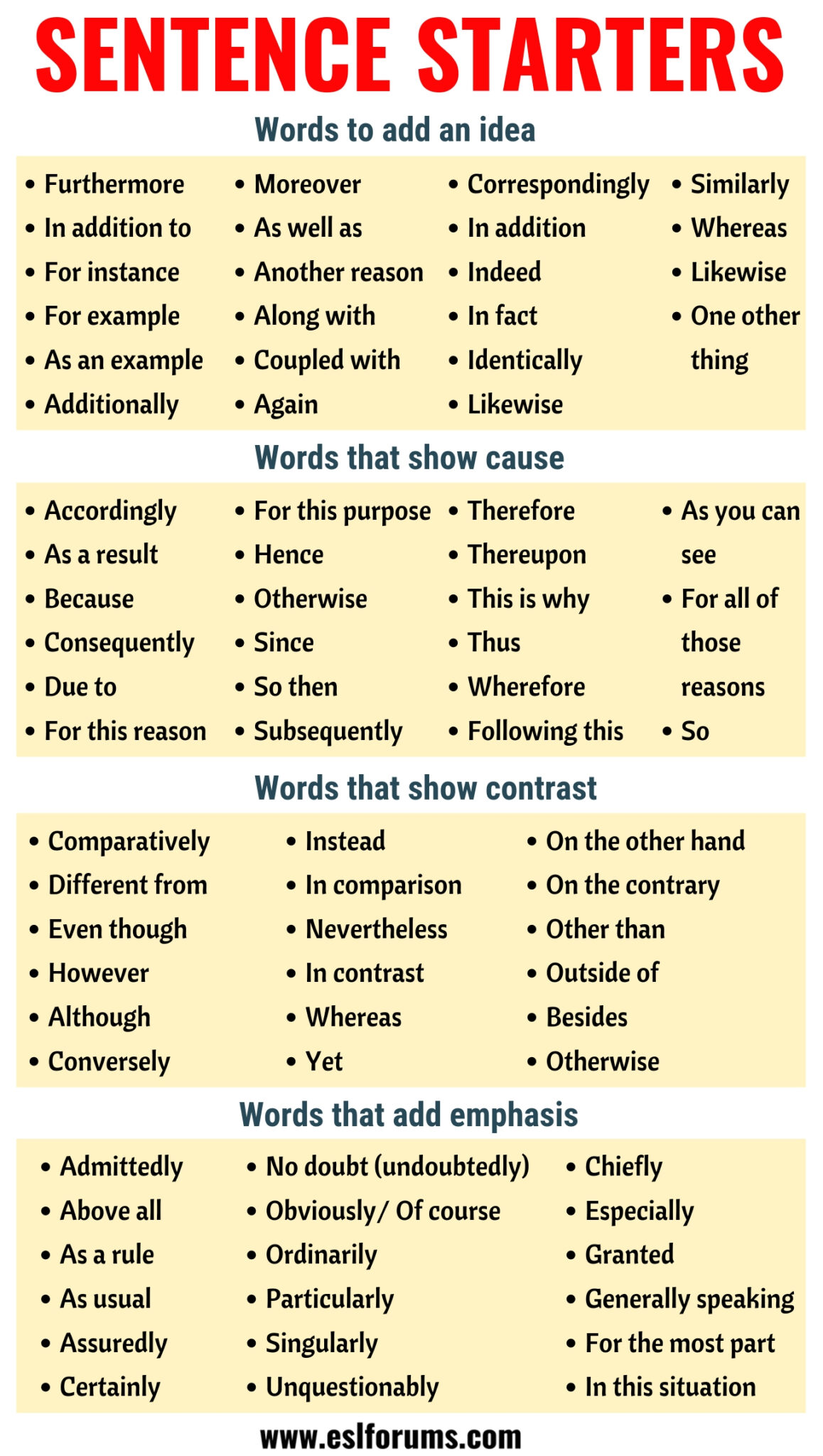
Sentence Starters | Infographic
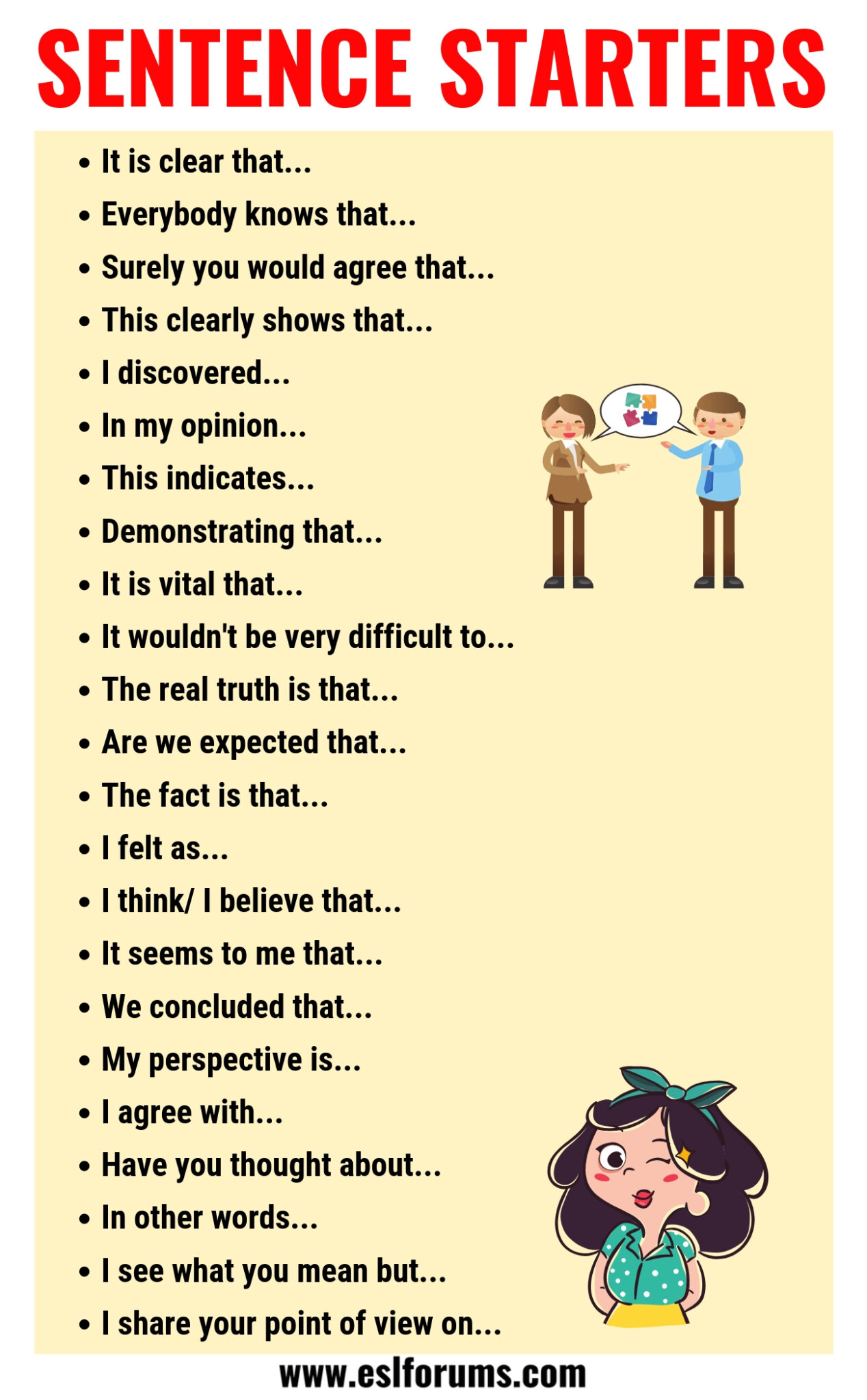
ALIYI Ahmad
Sunday 30th of April 2023
This great gift thank you forever
Wednesday 7th of December 2022
thank that helped m out alot
Thursday 1st of December 2022
Amazing list. It helps change up how you start your sentence, and it helps for writers to keep readers engaged.
Friday 27th of May 2022
so i think that there should be more expansion so we can tell the reader a bit more about what is happening
Wednesday 6th of April 2022
i like his book

Get science-backed answers as you write with Paperpal's Research feature
Useful Sentence Starters For Academic Writing
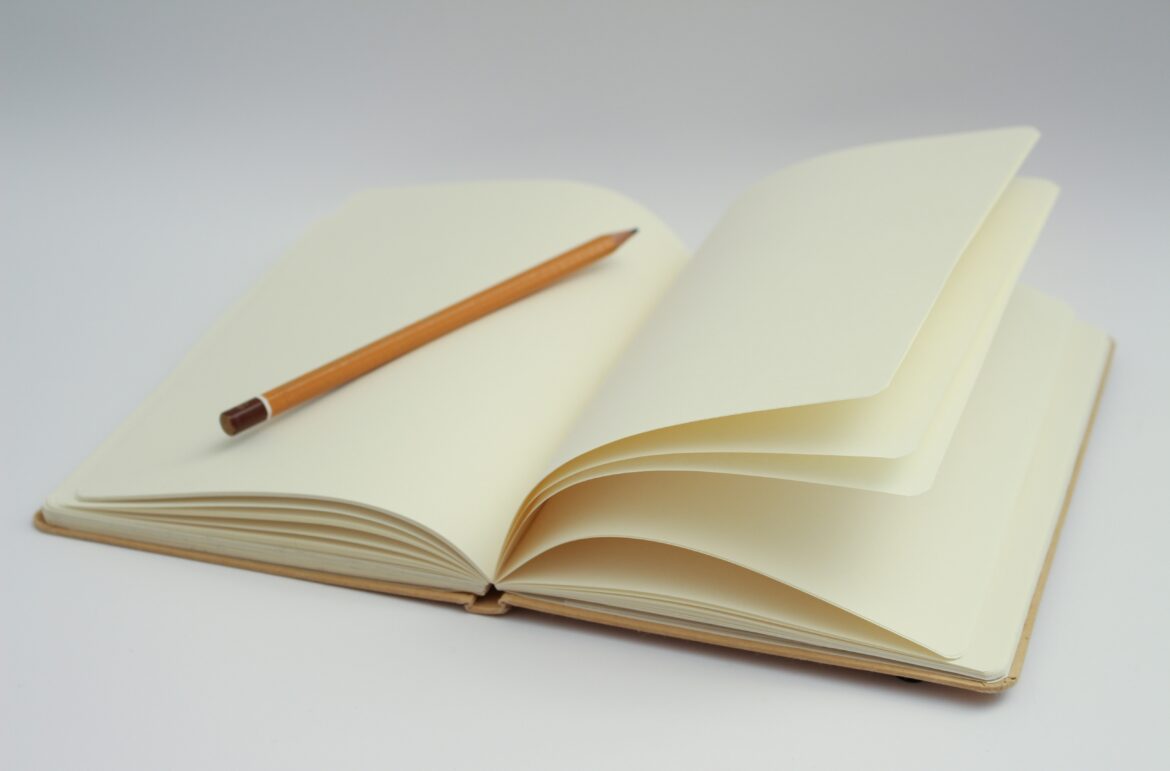
In academic writing, sentence starters play a vital role in organizing your ideas, conveying your arguments effectively, and maintaining a flow throughout your research paper. In this blog post, we will explore various sentence starters that can elevate the quality of your academic writing and provide examples tailored to research-based essays.
Why are sentence starters useful
Sentence starters are particularly helpful in introductions to grab the reader’s attention and provide a clear roadmap for the research essay. They can be employed when introducing a new argument or point, creating a smooth transition between paragraphs, or when emphasizing key ideas. Additionally, sentence starters are beneficial in conclusions to summarize key findings, restate the thesis, and leave a lasting impression on the reader.
Moreover, sentence starters are valuable in comparisons to highlight similarities or differences, in sequences or lists to provide a structured flow of ideas, and in elaboration to expand on points or introduce new evidence. They can also be used to express uncertainty or doubt when discussing conflicting perspectives or limitations in the research. Overall, sentence starters add coherence, clarity, and sophistication to academic writing, making it more compelling and engaging for the reader .
Introduction sentence starters for essays
These sentence starters introduce what the paragraph or entire text is about so the readers know what to expect.
- “This study aims to…”
Example: This study aims to investigate the correlation between social media usage and mental health among teenagers.
- “In recent years, research has shown…”
Example: In recent years, research has shown a growing interest in the potential therapeutic benefits of mindfulness practices.
- “The purpose of this research is to…”
Example: The purpose of this research is to examine the impact of climate change on biodiversity in tropical rainforests.
Conclusion sentence starters
These sentence starters are helpful to hint at the reader that you’re about to wrap things up so they don’t expect any new points or evidence.
- “In conclusion, it is evident that…”
Example: In conclusion, it is evident that the implementation of renewable energy sources is crucial for mitigating the effects of global warming.
- “Based on the findings, it can be concluded that…”
Example: Based on the findings, it can be concluded that regular exercise contributes to improved cognitive function in older adults.
- “Overall, this research sheds light on…”
Example: Overall, this research sheds light on the importance of early intervention programs for children with learning disabilities.
Good sentence starters for comparisons
These sentence starters show that two things are related or alike.
- “Similarly,…”
Example: Similarly, both studies observed a significant decrease in cholesterol levels among participants who followed a Mediterranean diet.
- “In contrast to…”
Example: In contrast to previous research, this study found no significant relationship between caffeine consumption and sleep disturbances.
- “Like X, Y also…”
Example: Like previous studies, this research also highlights the impact of air pollution on respiratory health.
Good sentence starters for sequences or lists
Sentence starters for sequences are used to begin or relate lists of instructions or explaining a series of events.
- “ Firstly, …”
Example: Firstly, the survey gathered demographic information from participants.
- “ Secondly, …”
Example: Secondly, the data analysis involved statistical techniques to identify patterns and trends.
- “Finally, …”
Example: Finally, the study proposed recommendations for future research in this field.
Good sentence starters for elaboration or adding new points
These sentence starters ease the transition from explaining the larger picture to showing examples of minute details.
- “ Moreover, …”
Example: Moreover, this research emphasizes the importance of incorporating ethical considerations in clinical trials.
- “Additionally, …”
Example: Additionally, previous studies have identified socioeconomic factors as influential determinants of educational attainment.
- “Furthermore, …”
Example: Furthermore, the research findings highlight the need for more extensive sample sizes to draw generalizable conclusions.
Good sentence starters to show uncertainty or doubt
These sentence starters help in explaining to the reader that there is an upcoming contrasting idea or thought.
- “ Although the results suggest…”
Example: Although the results suggest a positive correlation, further investigation is warranted to establish a causal relationship.
- “It is plausible that…”
Example: It is plausible that the observed variations in results could be attributed to differences in sample demographics.
- “It remains unclear whether…”
Example: It remains unclear whether the observed changes in behavior are transient or long-lasting.
In conclusion, sentence starters serve as valuable tools in academic writing, enabling you to structure your thoughts, enhance clarity, and guide readers through your research essays. Use them in abundance yet carefully, as they can enhance your quality of writing significantly.
Paperpal is a comprehensive AI writing toolkit that helps students and researchers achieve 2x the writing in half the time. It leverages 21+ years of STM experience and insights from millions of research articles to provide in-depth academic writing, language editing, and submission readiness support to help you write better, faster.
Get accurate academic translations, rewriting support, grammar checks, vocabulary suggestions, and generative AI assistance that delivers human precision at machine speed. Try for free or upgrade to Paperpal Prime starting at US$19 a month to access premium features, including consistency, plagiarism, and 30+ submission readiness checks to help you succeed.
Experience the future of academic writing – Sign up to Paperpal and start writing for free!
Related Reads:
- Using Metaphors in Academic Writing
- How and When to Use ‘then’ vs. ‘than’ [with Examples]
- Travelling or Traveling – Which Word is Correct?
- Proofreading Techniques and Tips for Academic Writing
Paperpal Surpasses 200,000 Users Globally
The difference between british english and american english: a quick guide, you may also like, how to structure an essay, mla works cited page: format, template & examples, powerful academic phrases to improve your essay writing , academic editing: how to self-edit academic text with..., how to use ai to enhance your college..., how to use paperpal to generate emails &..., word choice problems: how to use the right..., how to paraphrase research papers effectively, 4 types of transition words for research papers , paraphrasing in academic writing: answering top author queries.
Get Talking with These Sentence Starters: The Ultimate Guide
Sentence starters are an essential tool for anyone who wants to improve their writing skills. They are words or phrases that help to introduce the rest of the sentence, typically set apart by commas. The words that start a sentence are some of the most important in writing: They introduce what the sentence is about so the reader knows what to expect.
In this article, we will explore the benefits of using sentence starters in your writing. We will provide you with examples of sentence starters that you can use in your own writing, and we will explain how to use them effectively. Whether you are a student looking to improve your essay writing skills, or a professional looking to enhance your communication skills, this article will provide you with the tools you need to succeed.

Sentence Starters
What are sentence starters.
As the name would suggest, sentence starters are any words or phrases that can be used to perfectly start a sentence. Every sentence is different, so every sentence requires a different starter to really convey a meaning. A common sentence starter like “however” has a very specific purpose. You wouldn’t just be able to throw the word “however” into the first sentence of an essay, for example, because it wouldn’t be compared against anything.
However, it is a good idea to figure out when is the best time to use certain sentence starters to really add something extra to your writing. It will be what separates you from the rest of the crowd when you get a better understanding of how it should all work.
The Importance of Variety in Sentence Starters
When it comes to writing, sentence starters play a crucial role in grabbing the reader’s attention and conveying the message effectively. However, using the same sentence starters repeatedly can make the writing monotonous and dull, leading to a loss of interest from the reader. This is where the importance of variety in sentence starters comes into play.
Using a mixture of different sentence starters can keep the reader engaged and interested in the content. It also adds emphasis to important points in the text and makes the writing more lively and enjoyable to read.
Additionally, using a variety of sentence starters can help the writer to convey different emotions and tones in their writing. For example, using a rhetorical question as a sentence starter can create a sense of curiosity and make the reader think deeply about the topic. On the other hand, using a declarative sentence as a starter can convey a sense of confidence and authority.
To achieve variety in sentence starters, writers can use a combination of techniques such as varying the length and structure of sentences, using different types of phrases, and incorporating transitional words. By doing so, the writing becomes more dynamic and engaging, making the reader want to keep reading.
Types of Sentence Starters
When it comes to writing, it’s important to have a variety of sentence starters in your arsenal. Different types of sentence starters can help you achieve different effects in your writing. In this section, we’ll cover three types of sentence starters: conjunction starters, adverb starters, and prepositional phrase starters.
Conjunction Starters
Conjunction starters are words that are used to connect two ideas or thoughts. They can be used to show contrast, addition, or cause and effect. Some common conjunction starters include:
| Conjunction | Example |
|---|---|
| And | “She went to the store, and she bought some milk.” |
| But | “He wanted to go to the party, but he had to work.” |
| Or | “Do you want pizza or pasta for dinner?” |
| So | “She missed the bus, so she had to walk to work.” |
Adverb Starters
Adverb starters are words that modify the verb in a sentence. They can be used to describe how, when, where, or to what extent something is happening. Some common adverb starters include:
- Nevertheless
- Furthermore
- Additionally
Here are some examples of adverb starters in use:
- “However, he didn’t let that stop him from pursuing his dreams.”
- “Nevertheless, she persisted in her efforts to make a change.”
- “Furthermore, the study found that the results were consistent across all age groups.”
- “Therefore, it is important to take precautions to prevent the spread of the virus.”
- “Additionally, the report showed that there was a significant increase in sales.”
Prepositional Phrase Starters
Prepositional phrase starters are words that are used to describe the relationship between two things in a sentence. They can be used to show location, time, or direction. Some common prepositional phrase starters include:
Here are some examples of prepositional phrase starters in use:
- “In the morning, she always enjoyed a cup of coffee.”
- “On the way to work, he listened to his favorite podcast .”
- “At the party, she met some new friends.”
- “With a little practice, he became an expert at playing the guitar.”
- “By the end of the day, she was exhausted from all the work.”
Examples of Sentence Starters
When it comes to writing, sentence starters can be incredibly useful. They can help writers get their thoughts flowing, organize their ideas, and make their writing more engaging. In this section, we’ll take a look at some examples of sentence starters that can be used for different types of writing.
For Storytelling
When telling a story, it’s important to hook your readers from the very beginning. Here are some sentence starters that can be used to do just that:
- Once upon a time…
- It all started when…
- In a far-off land…
- Long ago and far away…
- Deep in the heart of…
These sentence starters can be used to set the scene and draw the reader in. Once you’ve hooked your reader, you can use the following sentence starters to move the story along:
- Suddenly…
- Just then…
- Meanwhile…
- Later that day…
- The next morning…
When writing an essay, it’s important to clearly state your argument and support it with evidence. Here are some sentence starters that can help you do just that:
- According to…
- In contrast…
- Similarly…
- On the other hand …
- For example …
These sentence starters can be used to introduce evidence and support your argument. Additionally, you can use the following sentence starters to transition between paragraphs:
- Moving on to…
- In conclusion …
- Taking a closer look…
- Another important point…
- It’s worth noting that…
For Business Writing
When writing for business, it’s important to be clear and concise. Here are some sentence starters that can help you achieve that:
- As previously mentioned…
- To summarize…
- In other words…
- To put it simply…
- The bottom line is…
These sentence starters can be used to summarize information and make your writing more concise. Additionally, you can use the following sentence starters to make requests or give instructions:
- I would appreciate it if…
- Please be advised that…
- Kindly note that…
- In order to…
- It is imperative that…
By using these sentence starters, you can make your business writing more effective and efficient.
Common Mistakes to Avoid
When it comes to using sentence starters, there are some common mistakes that writers should avoid. Here are a few to keep in mind:
Overusing the Same Sentence Starter
One of the most common mistakes writers make is overusing the same sentence starter throughout their writing. While sentence starters can be helpful in guiding the reader through your writing, using the same one repeatedly can make your writing sound repetitive and monotonous. To avoid this, try using a variety of sentence starters throughout your writing.
Using Sentence Starters Incorrectly
Another mistake writers make is using sentence starters incorrectly. For example, beginning a sentence with “and” or “but” can be effective in some cases, but it’s important to use these words appropriately. Additionally, some sentence starters may not be appropriate for certain writing styles or contexts. Make sure to consider the tone and purpose of your writing before using a particular sentence starter.
Failing to Vary Sentence Structure
Using sentence starters can be a great way to vary sentence structure and keep your writing engaging. However, it’s important to also vary the structure of your sentences themselves. Using the same sentence structure repeatedly can make your writing sound dull and uninteresting. Try experimenting with different sentence structures to keep your writing fresh and engaging.
Neglecting Punctuation
Finally, it’s important to remember that sentence starters are just one aspect of good writing. Neglecting punctuation can make your writing difficult to understand and detract from its overall effectiveness. Make sure to use punctuation correctly and consistently throughout your writing.
By keeping these common mistakes in mind, writers can use sentence starters effectively to improve the flow and readability of their writing.
In conclusion, sentence starters are an essential tool that writers use to make their work more organized, coherent, and easy to read. They help to create a smooth flow of ideas and thoughts, making it easier for the reader to follow the writer’s argument or story.
Good sentence starters can be used in different types of writing, including essays, articles, research papers, and even fiction. They help to introduce new ideas, provide evidence, summarize key points, and make transitions between paragraphs and sections.
The use of sentence starters can also help to improve the quality of writing by making it more engaging and captivating. They can be used to create suspense, add emphasis, and convey emotions. Additionally, sentence starters can help to make writing more concise and clear, avoiding ambiguity and confusion.
Overall, using sentence starters is an effective way to improve the quality of writing and make it more organized, coherent, and engaging. Whether you are a student, a professional writer, or someone who enjoys writing for fun, incorporating sentence starters into your work can help you achieve your writing goals and captivate your audience.
Frequently Asked Questions
What are some effective ways to start a sentence?
There are many effective ways to start a sentence, but it all depends on the context and purpose of your writing. Some common ways to start a sentence include using transitional words and phrases, such as “however,” “in addition,” or “meanwhile,” or starting with a strong subject or action verb. You can also use rhetorical questions, quotes, or interesting facts to grab the reader’s attention and set the tone for your writing.
How can sentence starters be used in persuasive writing?
Sentence starters can be very useful in persuasive writing because they can help you introduce your argument and provide evidence to support it. Some effective sentence starters for persuasive writing include “it is clear that,” “research shows that,” or “experts agree that.” These types of sentence starters can help you establish credibility and persuade your reader to agree with your point of view.
What are some common transition sentence starters?
Common transition sentence starters include “however,” “in addition,” “meanwhile,” “therefore,” and “consequently.” These words and phrases can help you connect ideas and create a smooth flow between sentences and paragraphs.
What are some sentence starters for creative writing?
Creative writing often requires more varied and imaginative sentence starters to create a unique and engaging story. Some examples of sentence starters for creative writing include “once upon a time,” “suddenly,” “in a far-off land,” or “the world was never the same again.” These types of sentence starters can help you set the scene, create suspense, or introduce a new character or plot twist.
How can sentence starters be used in speaking?
Sentence starters can be very useful in speaking because they can help you organize your thoughts and communicate your ideas more effectively. Some effective sentence starters for speaking include “I believe that,” “in my opinion,” or “from my experience.” These types of sentence starters can help you express your ideas clearly and confidently.
What are some sentence starters for providing evidence?
When providing evidence to support your argument, it’s important to use sentence starters that clearly indicate the source and relevance of your evidence. Some effective sentence starters for providing evidence include “according to,” “as demonstrated by,” or “for example.” These types of sentence starters can help you present your evidence in a clear and convincing way.
Last Updated on August 9, 2023
Leave a Comment Cancel reply
Last places remaining for July 14th and July 28th courses . Enrol now and join students from 175 countries for the summer of a lifetime
- 40 Useful Words and Phrases for Top-Notch Essays

To be truly brilliant, an essay needs to utilise the right language. You could make a great point, but if it’s not intelligently articulated, you almost needn’t have bothered.
Developing the language skills to build an argument and to write persuasively is crucial if you’re to write outstanding essays every time. In this article, we’re going to equip you with the words and phrases you need to write a top-notch essay, along with examples of how to utilise them.
It’s by no means an exhaustive list, and there will often be other ways of using the words and phrases we describe that we won’t have room to include, but there should be more than enough below to help you make an instant improvement to your essay-writing skills.
If you’re interested in developing your language and persuasive skills, Oxford Royale offers summer courses at its Oxford Summer School , Cambridge Summer School , London Summer School , San Francisco Summer School and Yale Summer School . You can study courses to learn english , prepare for careers in law , medicine , business , engineering and leadership.
General explaining
Let’s start by looking at language for general explanations of complex points.
1. In order to
Usage: “In order to” can be used to introduce an explanation for the purpose of an argument. Example: “In order to understand X, we need first to understand Y.”
2. In other words
Usage: Use “in other words” when you want to express something in a different way (more simply), to make it easier to understand, or to emphasise or expand on a point. Example: “Frogs are amphibians. In other words, they live on the land and in the water.”
3. To put it another way
Usage: This phrase is another way of saying “in other words”, and can be used in particularly complex points, when you feel that an alternative way of wording a problem may help the reader achieve a better understanding of its significance. Example: “Plants rely on photosynthesis. To put it another way, they will die without the sun.”
4. That is to say
Usage: “That is” and “that is to say” can be used to add further detail to your explanation, or to be more precise. Example: “Whales are mammals. That is to say, they must breathe air.”
5. To that end
Usage: Use “to that end” or “to this end” in a similar way to “in order to” or “so”. Example: “Zoologists have long sought to understand how animals communicate with each other. To that end, a new study has been launched that looks at elephant sounds and their possible meanings.”
Adding additional information to support a point
Students often make the mistake of using synonyms of “and” each time they want to add further information in support of a point they’re making, or to build an argument. Here are some cleverer ways of doing this.
6. Moreover
Usage: Employ “moreover” at the start of a sentence to add extra information in support of a point you’re making. Example: “Moreover, the results of a recent piece of research provide compelling evidence in support of…”
7. Furthermore
Usage:This is also generally used at the start of a sentence, to add extra information. Example: “Furthermore, there is evidence to suggest that…”
8. What’s more
Usage: This is used in the same way as “moreover” and “furthermore”. Example: “What’s more, this isn’t the only evidence that supports this hypothesis.”
9. Likewise
Usage: Use “likewise” when you want to talk about something that agrees with what you’ve just mentioned. Example: “Scholar A believes X. Likewise, Scholar B argues compellingly in favour of this point of view.”
10. Similarly
Usage: Use “similarly” in the same way as “likewise”. Example: “Audiences at the time reacted with shock to Beethoven’s new work, because it was very different to what they were used to. Similarly, we have a tendency to react with surprise to the unfamiliar.”
11. Another key thing to remember
Usage: Use the phrase “another key point to remember” or “another key fact to remember” to introduce additional facts without using the word “also”. Example: “As a Romantic, Blake was a proponent of a closer relationship between humans and nature. Another key point to remember is that Blake was writing during the Industrial Revolution, which had a major impact on the world around him.”
12. As well as
Usage: Use “as well as” instead of “also” or “and”. Example: “Scholar A argued that this was due to X, as well as Y.”
13. Not only… but also
Usage: This wording is used to add an extra piece of information, often something that’s in some way more surprising or unexpected than the first piece of information. Example: “Not only did Edmund Hillary have the honour of being the first to reach the summit of Everest, but he was also appointed Knight Commander of the Order of the British Empire.”
14. Coupled with
Usage: Used when considering two or more arguments at a time. Example: “Coupled with the literary evidence, the statistics paint a compelling view of…”
15. Firstly, secondly, thirdly…
Usage: This can be used to structure an argument, presenting facts clearly one after the other. Example: “There are many points in support of this view. Firstly, X. Secondly, Y. And thirdly, Z.
16. Not to mention/to say nothing of
Usage: “Not to mention” and “to say nothing of” can be used to add extra information with a bit of emphasis. Example: “The war caused unprecedented suffering to millions of people, not to mention its impact on the country’s economy.”
Words and phrases for demonstrating contrast
When you’re developing an argument, you will often need to present contrasting or opposing opinions or evidence – “it could show this, but it could also show this”, or “X says this, but Y disagrees”. This section covers words you can use instead of the “but” in these examples, to make your writing sound more intelligent and interesting.
17. However
Usage: Use “however” to introduce a point that disagrees with what you’ve just said. Example: “Scholar A thinks this. However, Scholar B reached a different conclusion.”
18. On the other hand
Usage: Usage of this phrase includes introducing a contrasting interpretation of the same piece of evidence, a different piece of evidence that suggests something else, or an opposing opinion. Example: “The historical evidence appears to suggest a clear-cut situation. On the other hand, the archaeological evidence presents a somewhat less straightforward picture of what happened that day.”
19. Having said that
Usage: Used in a similar manner to “on the other hand” or “but”. Example: “The historians are unanimous in telling us X, an agreement that suggests that this version of events must be an accurate account. Having said that, the archaeology tells a different story.”
20. By contrast/in comparison
Usage: Use “by contrast” or “in comparison” when you’re comparing and contrasting pieces of evidence. Example: “Scholar A’s opinion, then, is based on insufficient evidence. By contrast, Scholar B’s opinion seems more plausible.”
21. Then again
Usage: Use this to cast doubt on an assertion. Example: “Writer A asserts that this was the reason for what happened. Then again, it’s possible that he was being paid to say this.”
22. That said
Usage: This is used in the same way as “then again”. Example: “The evidence ostensibly appears to point to this conclusion. That said, much of the evidence is unreliable at best.”
Usage: Use this when you want to introduce a contrasting idea. Example: “Much of scholarship has focused on this evidence. Yet not everyone agrees that this is the most important aspect of the situation.”
Adding a proviso or acknowledging reservations
Sometimes, you may need to acknowledge a shortfalling in a piece of evidence, or add a proviso. Here are some ways of doing so.
24. Despite this
Usage: Use “despite this” or “in spite of this” when you want to outline a point that stands regardless of a shortfalling in the evidence. Example: “The sample size was small, but the results were important despite this.”

25. With this in mind
Usage: Use this when you want your reader to consider a point in the knowledge of something else. Example: “We’ve seen that the methods used in the 19th century study did not always live up to the rigorous standards expected in scientific research today, which makes it difficult to draw definite conclusions. With this in mind, let’s look at a more recent study to see how the results compare.”
26. Provided that
Usage: This means “on condition that”. You can also say “providing that” or just “providing” to mean the same thing. Example: “We may use this as evidence to support our argument, provided that we bear in mind the limitations of the methods used to obtain it.”
27. In view of/in light of
Usage: These phrases are used when something has shed light on something else. Example: “In light of the evidence from the 2013 study, we have a better understanding of…”
28. Nonetheless
Usage: This is similar to “despite this”. Example: “The study had its limitations, but it was nonetheless groundbreaking for its day.”
29. Nevertheless
Usage: This is the same as “nonetheless”. Example: “The study was flawed, but it was important nevertheless.”
30. Notwithstanding
Usage: This is another way of saying “nonetheless”. Example: “Notwithstanding the limitations of the methodology used, it was an important study in the development of how we view the workings of the human mind.”
Giving examples
Good essays always back up points with examples, but it’s going to get boring if you use the expression “for example” every time. Here are a couple of other ways of saying the same thing.
31. For instance
Example: “Some birds migrate to avoid harsher winter climates. Swallows, for instance, leave the UK in early winter and fly south…”
32. To give an illustration
Example: “To give an illustration of what I mean, let’s look at the case of…”
Signifying importance
When you want to demonstrate that a point is particularly important, there are several ways of highlighting it as such.
33. Significantly
Usage: Used to introduce a point that is loaded with meaning that might not be immediately apparent. Example: “Significantly, Tacitus omits to tell us the kind of gossip prevalent in Suetonius’ accounts of the same period.”
34. Notably
Usage: This can be used to mean “significantly” (as above), and it can also be used interchangeably with “in particular” (the example below demonstrates the first of these ways of using it). Example: “Actual figures are notably absent from Scholar A’s analysis.”
35. Importantly
Usage: Use “importantly” interchangeably with “significantly”. Example: “Importantly, Scholar A was being employed by X when he wrote this work, and was presumably therefore under pressure to portray the situation more favourably than he perhaps might otherwise have done.”
Summarising
You’ve almost made it to the end of the essay, but your work isn’t over yet. You need to end by wrapping up everything you’ve talked about, showing that you’ve considered the arguments on both sides and reached the most likely conclusion. Here are some words and phrases to help you.
36. In conclusion
Usage: Typically used to introduce the concluding paragraph or sentence of an essay, summarising what you’ve discussed in a broad overview. Example: “In conclusion, the evidence points almost exclusively to Argument A.”
37. Above all
Usage: Used to signify what you believe to be the most significant point, and the main takeaway from the essay. Example: “Above all, it seems pertinent to remember that…”
38. Persuasive
Usage: This is a useful word to use when summarising which argument you find most convincing. Example: “Scholar A’s point – that Constanze Mozart was motivated by financial gain – seems to me to be the most persuasive argument for her actions following Mozart’s death.”
39. Compelling
Usage: Use in the same way as “persuasive” above. Example: “The most compelling argument is presented by Scholar A.”
40. All things considered
Usage: This means “taking everything into account”. Example: “All things considered, it seems reasonable to assume that…”
How many of these words and phrases will you get into your next essay? And are any of your favourite essay terms missing from our list? Let us know in the comments below, or get in touch here to find out more about courses that can help you with your essays.
At Oxford Royale Academy, we offer a number of summer school courses for young people who are keen to improve their essay writing skills. Click here to apply for one of our courses today, including law , business , medicine and engineering .
Comments are closed.
Have a language expert improve your writing
Run a free plagiarism check in 10 minutes, generate accurate citations for free.
- Knowledge Base
- How to write an essay introduction | 4 steps & examples
How to Write an Essay Introduction | 4 Steps & Examples
Published on February 4, 2019 by Shona McCombes . Revised on July 23, 2023.
A good introduction paragraph is an essential part of any academic essay . It sets up your argument and tells the reader what to expect.
The main goals of an introduction are to:
- Catch your reader’s attention.
- Give background on your topic.
- Present your thesis statement —the central point of your essay.
This introduction example is taken from our interactive essay example on the history of Braille.
The invention of Braille was a major turning point in the history of disability. The writing system of raised dots used by visually impaired people was developed by Louis Braille in nineteenth-century France. In a society that did not value disabled people in general, blindness was particularly stigmatized, and lack of access to reading and writing was a significant barrier to social participation. The idea of tactile reading was not entirely new, but existing methods based on sighted systems were difficult to learn and use. As the first writing system designed for blind people’s needs, Braille was a groundbreaking new accessibility tool. It not only provided practical benefits, but also helped change the cultural status of blindness. This essay begins by discussing the situation of blind people in nineteenth-century Europe. It then describes the invention of Braille and the gradual process of its acceptance within blind education. Subsequently, it explores the wide-ranging effects of this invention on blind people’s social and cultural lives.
Instantly correct all language mistakes in your text
Upload your document to correct all your mistakes in minutes

Table of contents
Step 1: hook your reader, step 2: give background information, step 3: present your thesis statement, step 4: map your essay’s structure, step 5: check and revise, more examples of essay introductions, other interesting articles, frequently asked questions about the essay introduction.
Your first sentence sets the tone for the whole essay, so spend some time on writing an effective hook.
Avoid long, dense sentences—start with something clear, concise and catchy that will spark your reader’s curiosity.
The hook should lead the reader into your essay, giving a sense of the topic you’re writing about and why it’s interesting. Avoid overly broad claims or plain statements of fact.
Examples: Writing a good hook
Take a look at these examples of weak hooks and learn how to improve them.
- Braille was an extremely important invention.
- The invention of Braille was a major turning point in the history of disability.
The first sentence is a dry fact; the second sentence is more interesting, making a bold claim about exactly why the topic is important.
- The internet is defined as “a global computer network providing a variety of information and communication facilities.”
- The spread of the internet has had a world-changing effect, not least on the world of education.
Avoid using a dictionary definition as your hook, especially if it’s an obvious term that everyone knows. The improved example here is still broad, but it gives us a much clearer sense of what the essay will be about.
- Mary Shelley’s Frankenstein is a famous book from the nineteenth century.
- Mary Shelley’s Frankenstein is often read as a crude cautionary tale about the dangers of scientific advancement.
Instead of just stating a fact that the reader already knows, the improved hook here tells us about the mainstream interpretation of the book, implying that this essay will offer a different interpretation.
Receive feedback on language, structure, and formatting
Professional editors proofread and edit your paper by focusing on:
- Academic style
- Vague sentences
- Style consistency
See an example

Next, give your reader the context they need to understand your topic and argument. Depending on the subject of your essay, this might include:
- Historical, geographical, or social context
- An outline of the debate you’re addressing
- A summary of relevant theories or research about the topic
- Definitions of key terms
The information here should be broad but clearly focused and relevant to your argument. Don’t give too much detail—you can mention points that you will return to later, but save your evidence and interpretation for the main body of the essay.
How much space you need for background depends on your topic and the scope of your essay. In our Braille example, we take a few sentences to introduce the topic and sketch the social context that the essay will address:
Now it’s time to narrow your focus and show exactly what you want to say about the topic. This is your thesis statement —a sentence or two that sums up your overall argument.
This is the most important part of your introduction. A good thesis isn’t just a statement of fact, but a claim that requires evidence and explanation.
The goal is to clearly convey your own position in a debate or your central point about a topic.
Particularly in longer essays, it’s helpful to end the introduction by signposting what will be covered in each part. Keep it concise and give your reader a clear sense of the direction your argument will take.
Prevent plagiarism. Run a free check.
As you research and write, your argument might change focus or direction as you learn more.
For this reason, it’s often a good idea to wait until later in the writing process before you write the introduction paragraph—it can even be the very last thing you write.
When you’ve finished writing the essay body and conclusion , you should return to the introduction and check that it matches the content of the essay.
It’s especially important to make sure your thesis statement accurately represents what you do in the essay. If your argument has gone in a different direction than planned, tweak your thesis statement to match what you actually say.
To polish your writing, you can use something like a paraphrasing tool .
You can use the checklist below to make sure your introduction does everything it’s supposed to.
Checklist: Essay introduction
My first sentence is engaging and relevant.
I have introduced the topic with necessary background information.
I have defined any important terms.
My thesis statement clearly presents my main point or argument.
Everything in the introduction is relevant to the main body of the essay.
You have a strong introduction - now make sure the rest of your essay is just as good.
- Argumentative
- Literary analysis
This introduction to an argumentative essay sets up the debate about the internet and education, and then clearly states the position the essay will argue for.
The spread of the internet has had a world-changing effect, not least on the world of education. The use of the internet in academic contexts is on the rise, and its role in learning is hotly debated. For many teachers who did not grow up with this technology, its effects seem alarming and potentially harmful. This concern, while understandable, is misguided. The negatives of internet use are outweighed by its critical benefits for students and educators—as a uniquely comprehensive and accessible information source; a means of exposure to and engagement with different perspectives; and a highly flexible learning environment.
This introduction to a short expository essay leads into the topic (the invention of the printing press) and states the main point the essay will explain (the effect of this invention on European society).
In many ways, the invention of the printing press marked the end of the Middle Ages. The medieval period in Europe is often remembered as a time of intellectual and political stagnation. Prior to the Renaissance, the average person had very limited access to books and was unlikely to be literate. The invention of the printing press in the 15th century allowed for much less restricted circulation of information in Europe, paving the way for the Reformation.
This introduction to a literary analysis essay , about Mary Shelley’s Frankenstein , starts by describing a simplistic popular view of the story, and then states how the author will give a more complex analysis of the text’s literary devices.
Mary Shelley’s Frankenstein is often read as a crude cautionary tale. Arguably the first science fiction novel, its plot can be read as a warning about the dangers of scientific advancement unrestrained by ethical considerations. In this reading, and in popular culture representations of the character as a “mad scientist”, Victor Frankenstein represents the callous, arrogant ambition of modern science. However, far from providing a stable image of the character, Shelley uses shifting narrative perspectives to gradually transform our impression of Frankenstein, portraying him in an increasingly negative light as the novel goes on. While he initially appears to be a naive but sympathetic idealist, after the creature’s narrative Frankenstein begins to resemble—even in his own telling—the thoughtlessly cruel figure the creature represents him as.
If you want to know more about AI tools , college essays , or fallacies make sure to check out some of our other articles with explanations and examples or go directly to our tools!
- Ad hominem fallacy
- Post hoc fallacy
- Appeal to authority fallacy
- False cause fallacy
- Sunk cost fallacy
College essays
- Choosing Essay Topic
- Write a College Essay
- Write a Diversity Essay
- College Essay Format & Structure
- Comparing and Contrasting in an Essay
(AI) Tools
- Grammar Checker
- Paraphrasing Tool
- Text Summarizer
- AI Detector
- Plagiarism Checker
- Citation Generator
Your essay introduction should include three main things, in this order:
- An opening hook to catch the reader’s attention.
- Relevant background information that the reader needs to know.
- A thesis statement that presents your main point or argument.
The length of each part depends on the length and complexity of your essay .
The “hook” is the first sentence of your essay introduction . It should lead the reader into your essay, giving a sense of why it’s interesting.
To write a good hook, avoid overly broad statements or long, dense sentences. Try to start with something clear, concise and catchy that will spark your reader’s curiosity.
A thesis statement is a sentence that sums up the central point of your paper or essay . Everything else you write should relate to this key idea.
The thesis statement is essential in any academic essay or research paper for two main reasons:
- It gives your writing direction and focus.
- It gives the reader a concise summary of your main point.
Without a clear thesis statement, an essay can end up rambling and unfocused, leaving your reader unsure of exactly what you want to say.
The structure of an essay is divided into an introduction that presents your topic and thesis statement , a body containing your in-depth analysis and arguments, and a conclusion wrapping up your ideas.
The structure of the body is flexible, but you should always spend some time thinking about how you can organize your essay to best serve your ideas.
Cite this Scribbr article
If you want to cite this source, you can copy and paste the citation or click the “Cite this Scribbr article” button to automatically add the citation to our free Citation Generator.
McCombes, S. (2023, July 23). How to Write an Essay Introduction | 4 Steps & Examples. Scribbr. Retrieved July 10, 2024, from https://www.scribbr.com/academic-essay/introduction/
Is this article helpful?
Shona McCombes
Other students also liked, how to write a thesis statement | 4 steps & examples, academic paragraph structure | step-by-step guide & examples, how to conclude an essay | interactive example, get unlimited documents corrected.
✔ Free APA citation check included ✔ Unlimited document corrections ✔ Specialized in correcting academic texts
- English Grammar
- Sentence Starters
Sentence Starters - How to Use with Examples
Have you been finding it difficult to find good sentence starters? Do you think you have ideas but have some starting trouble? There is nothing to worry about if you do. All that you need to do is learn how to do it and apply them when penning down or voicing out your thoughts and ideas. This article will introduce you to what sentence starters are, how to use them effectively to form well-structured and coherent sentences in a paragraph along with examples for you to analyse and comprehend how it works.
Table of Contents
What is a sentence starter, where and how to use a sentence starter – points to remember, list of commonly used sentence starters, frequently asked questions on sentence starters.
Words and phrases that start off a sentence or introduce a thought can be referred to as sentence starters. Sentence starters make your writing more connected and meaningful. When you are writing about a topic, it is not necessary that you mention your ideas that support it; there definitely will be points that you think are mention-worthy but contradictory. We use sentence starters to make the transition and flow from one point to another smooth. This is not just the case with sentences; the same technique can also be used to connect paragraphs as well.
When you sit down to write a speech, an essay or a report on a particular topic, you normally start by jotting down the points from the top of your head. To add to what you know, you might also research a little. It is only then that you put everything together. When you do this, it is very important that you compare and contrast your thoughts as well as all the points that you have collected as part of your research and put them together in a way that all of it makes complete sense. This is where sentence starters play a role.
Sentence starters prepare your target audience for what’s coming next. It lets you bridge the gap between a thought, its justification, its contradiction, its examples, affirming evidence and so on. Now, knowing a number of sentence starters alone will not help. You have to learn how and where to use them in order to make your writing or speech meaningful.
To help you make proper and effective use of sentence starters, here is a list of the kind of situations where the usage of a sentence starter will definitely prove beneficial.
- The first instance would be when you are introducing a new thought or idea; for example, the very first sentence that is used to begin a paragraph, an essay, a report or a story.
- Be it fiction or nonfiction, whatever you are writing about has to have an interesting beginning. A catchy thought and the way you use your words creatively is what will hook your readers.
- When backing a thought with some data or when providing information that support/justify your finding, you will need a sentence starter to make a connection to whatever you have spoken about previously.
- When you have two contrasting ideas placed next to each other, you will have to use a sentence starter.
- A sentence starter can also help you emphasise on whichever idea you think is important.
- A sentence starter is further used to transition from one paragraph to another.
- Finally, to conclude a writeup, you can use a sentence starter so that your audience knows that it is the end of your piece.
- As long as the punctuation of a sentence with a sentence starter is concerned, the only thing you will have to keep in mind is that a comma is usually placed after the sentence starter in case the sentence starter is a preposition, an adverb or a phrase.
Examples of Sentence Starters
Going through some examples of sentence starters can give you a deeper understanding of what they are and where all you can use them, so go through the following section and make use of the examples provided in your writing as and when required.
Take a look at the following examples of sentence starters that can be used in the various situations mentioned.
| This essay discusses | In this essay/paper | This essay introduces | You will find |
| The key aspect in this essay | The report enumerates | Emphasised are the | The central theme of this piece |
| On the other hand | On the contrary | Similarly | In the same way |
| Likewise | However | In comparison | Yet |
| Whereas | While | Despite this | In spite of this |
| Although | Still | Rather | Instead |
| Keeping that aside | Then again | In contrast to | Notwithstanding |
| Nevertheless | In the same manner | Contrary to this | Conversely |
| Given below are | Here is a list of | The list of … given below | First..second..third |
| Next | Firstly | Secondly | Eventually |
| As a first step | Later | The next step is to | Finally |
| The below table refers to | The table explains how | Given below is the table | Here is a table with the |
| In addition to this | Also | Furthermore | Additionally |
| Subsequently | Moreover | To elaborate | More importantly |
| In the same way | Just as important | Equally important is | Besides |
| Another instance | Then | As well as | To add to this |
| As a result of this | Resulting from this | This results in | The outcome |
| The evidence proves | Studies have shown | The results derived emphasises | This infers |
| It can be seen that | After examining | Therefore | Hence |
| So | All of these leads to the | With regard to previous studies | This reiterates the |
| For example | An example of it is | The following examples | Given below are examples |
| For instance | As an example | Such as | Namely |
| Consider the example of | Specifically | To illustrate | The examples below explain |
| Many studies show that | Numerous | A lot of | Most |
| More than .. percent of the .. | Majority of the | Almost all | The whole … community thinks.. |
| Commonly | Usually | Normally | The absolute choice is |
| Few | A few people | Some studies show that | Not many are of the opinion that |
| A rare case of this is | Rarely does this | Only on very few occasions | Scarcely |
| Historically | Initially | In the … century | … years ago |
| Centuries ago | Over time | Earlier | Formerly |
| Originally | In the beginning | Conventionally | Prior to this |
| Until now | In the past | Recent studies show | Customarily |
| … suggests that | According to … | With reference to | Based on the ideas of.. |
| … points out that | … challenges the idea of.. | … according to .. | The theory put forward by .. proves that.. |
| … supports the idea… | As seen by | Based on the findings of | The research on … shows that |
| As a result of .. | Due to the … | For this reason | This means that … |
| This would result in … | Therefore | Hence | And so |
| Certainly | Above all | To emphasise on this… | Undoubtedly |
| Surely | Arguably | Of course | Obviously |
| The obvious choice is.. | The important part is | What is important is .. | Most importantly |
| To end it .. | Finally | A final thought | Thus |
| In summary | To put it in a nutshell | In conclusion | To sum it all up |
| In short | Overall | All things considered | To wrap things up |
| On the whole | Putting it all together | To conclude | To summarise |
| Hence | With all this in mind | In brief | Summing up all that has been discussed so far … |
What is a sentence starter?
Words and phrases that start off a sentence or introduce a thought can be referred to as sentence starters.
What are sentence starters used for?
Sentence starters make your writing more connected and meaningful. Sentence starters prepare your target audience for what’s coming next. It lets you bridge the gap between a thought, its justification, its contradiction, its examples, affirming evidence and so on.
Give some sentence starters for an essay.
Here are some examples of essay starters that you can use to begin your essay.
- The essay discusses
- In this essay
- This essay focuses on
- The essay will introduce you to
Give some examples of sentence starters to start a paragraph.
Given below are a few examples of sentence starters to start a paragraph.
- Studies show that
- In the era of
- There are more than
- The research emphasises
- With reference to
Give some examples of sentence starters to conclude your writing.
Here are a few examples of sentence starters to help you conclude your piece of writing.
- In conclusion
- To put it in a nutshell
- To summarise
Register with BYJU'S & Download Free PDFs
Register with byju's & watch live videos.
- +44 7526 561243
- +44 7418 354159
- [email protected]

Sentence Starters For Essays: A Complete Guide
The best phase in your life is your college and school life, but this pretty phase also comes with multiple hurdles and challenges. Structuring essays for your school, educational institutes or other academic writing projects can sometimes be difficult for students. Most students from high schools and other senior-level schools have considered using suitable sentence starters for essays. Many of these students feel trapped in a maze when writing an essay using sentence starters.
But now, it’s time to ease the worries of the students. This blog will let you learn amazing ideas about how to pick good sentence starters for writing an effective essay. We have divided this blog into multiple subcategories to make this guide more comprehensive and understandable.
The Definition Of Sentence Starters
Sentence starters in essay writing can be defined as the collection of words or even phrases that we use at the start of a sentence in an essay. A sentence starter clearly indicates what your essay or paragraph is about and what main points it will focus on. Moreover, a sentence starter also explains the type of essay.
However, the sentence starters are not always meant to be astonishing and catchy. The tone of the sentence starters should be precise, and it should gain the reader’s attention. So, now you know what a sentence starter is, let’s move on to the next part and see what it is about.
The Significance Of A Sentence Starter
There is no doubt that sentence starters play an important role in writing an essay efficiently. The essay you are working on should clearly explain its purpose and vision to the readers. A sentence starter gains the reader’s attention at the start of an essay and makes the reader stay till the end by telling them about the article’s critical role.
The collection of good sentence starters comes with the most essential elements of writing an essay. These elements help the writers make the essay even more interesting for the readers and offer clues about what readers can expect next. Essay sentence starters have the right to bring cohesion to long writing pieces, especially in academic essays.
You can use good sentence starters in an essay to present an amazing transition from one paragraph to another. If you use the essay sentence introduction sentence starters at the start of the paragraph, it mostly enriches the quality of your essay.
The significance of sentence starters in an essay can never be underestimated; getting help from the best dissertation writing services or essay writing service providers can truly aid students in overcoming the difficulties of structuring an essay.
The Difference Between Sentence Starters & Transition Words
In simple terms, transition words are the collection of words or phrases that aid a writer in combining thoughts and ideas between two sentences or paragraphs. It will make things understandably easy.
Writers can use transition words as sentence starters for essays and vice versa. However, it should be noted that not all transition words can make sense in the category of essay sentence starters.
Some Useful Transition Words As University Sentence Starters For An Essay
For students who are willing to make their essay writing more creative and efficient, we have formed a list of some useful transition words:
- Alternatively
- At this time
- Consequently
- In effect of
- In contrast
- In other words
These transition words can easily be used as sentence starters for writing an essay or paragraph. It is also a great way to improve your writing style.
Until now, we have provided you with details like sentence starters, why it is important to use them in essays, and the difference between transition words and sentence starters in an essay. Now it’s time to enrich your knowledge of writing essays using sentence starters following some useful tips.
Useful Tips On Starting Sentence In An Essay
Structuring an essay is not only about presenting and expressing your ideas in words. There is a lot more that you can do. When writing an essay related to your academics, stay careful when using words in your essay.
However, the introduction is the most complex part of writing an essay. So, below, we have assembled some important and effective tips for students to structure essays properly, avoiding major mistakes.
- Create a rough draft of your ideas and how you will use them in writing.
- Select a catchy title for your essay.
- Form a list of good essay sentence starters. Make sure to go through the requirements of the essay to follow the guidelines properly.
- Arrange your points in a logical order.
- Align the sentences together; they should make sense of each other in the paragraph.
- Think of a strategy to grab the attention of the readers.
- The introduction part of the essay should define what exactly you will be writing in your essay and what’s your title about
- Never forget to write down the conclusion.
- You can use the examples of the essay as a reference; previously used examples can be mentioned too.
How To Search For Good Sentence Starters For Essay
The introduction paragraph matters a lot in an essay because it is the part that makes the readers stay and go through your whole essay, and it can also bore the readers with just one unattractive sentence. Maintaining the quality of your introduction paragraph will enhance the quality of the other paragraphs of your essay.
Moreover, to make your introduction paragraph attractive, you should create a catchy hook paragraph to excite readers so they keep reading your essay with interest. This is where good sentence starters can help you.
Here’s a way you can follow to pick the right starting sentence for your essay:
- Your language should be precise and clear
- You can do the addition of components of surprise
- Search for something that can aid you in bringing up the main topic
- Never use phrases like “I think” or “it may be”. You can replace these phrases with “believe” or “I am sure that”.
The Types Of Sentence Starters For Your Essay Topic
- This paper aims to
- Today’s topic covered in the paper includes
- This write-up focuses on
- One reason why
- The first thing to note is
The Ideas Of Sentence Starter To Close Sentences
Along with focusing and enriching the quality of your introduction paragraph, you should never underestimate the value of the closing sentence in an essay. Using the perfect writing tone to close your sentence in the paragraph is crucial. We have created a list of closing sentences from which you can take ideas while writing a closing paragraph.
- In light of what we have discussed
- Pieces of evidence and facts suggest that
- As conclusion
- To conclude
- To sum it up
- Taking everything into account
- In the final analysis
- On the whole
Paragraph Hook Starters
- Just as… [for an analogy]
- Do you know that…[for a fact]
- As per… [for a statistic]
EssayStarting Sentences For Indicating Orders/List
Sentence starters in essay for additional detailing .
- For example
- To elaborate
- Another way to put it would be
- In simple words
Starters For Comparison
If you are looking forward to using sentence starters for your essay for comparison of two or multiple things, here are some fine examples for you:
- The flip side is
- Rather than
- In contrast to
- Compared to
- On the other hand
- Even though
Sentence Starters For Essay Effects
Here are some effective ways to start a sentence in your essay and explain the reason or effect of something:
- That’s why
- In that case
- This is the scenario
- So that’s why
- Subsequently
Essay Sentence Starters For Sharing Information Of The Background
Below is the list of amazing sentence starters for essays if you are writing about background information in excessive detail:
- As everyone knows
- In this age of
- As mentioned previously
Top-Notch Sentence Starters For Historical Concepts
Most of the time, sentences do not make sense in an essay without the context present in them. This is why most readers are unaware that historical background is not the common knowledge they are reading about. This is where sentence starters can make it easy for the readers to differentiate by putting up the context, such as:
- Traditionally
- Historically
- Customarily
- In the past
- Conventionally
Short Steps Of Writing An Essay Effectively
To write an authentic essay that is attractive to readers or your professors, there are multiple steps that you can follow to make your essay superior. We are going to write down short and simple steps that you should focus on while writing your essay; the steps are as follows:
- Preparation
Preparation:
This step is the very basic step of starting an essay. It comes with multiple sub-steps: define your essay topic, do thorough research, collect resources, present a thesis, and create the outline of the essay.
It is the second and most important step in writing your essay. The writing procedure comes with various steps: write down the introduction paragraph, structure the main body, divide it into two paragraphs, and never miss out on writing the conclusion.
The revision is the last part of the essay’s writing process; the revision part contains multiple essential methods that you should always keep in mind while revising your essay. The methods are to assess the overall organisation, revise each paragraph, double-check for grammatical mistakes and language issues, and, ultimately, go through the plagiarism checker.
Conclusion:
Now, we are at the point where we have to end this informative blog. I hope you have gathered all the essential details provided about using sentence starters in this blog. Make sure to keep all the methods and tips in mind when writing your essay.

In order to continue enjoying our site, we ask that you confirm your identity as a human. Thank you very much for your cooperation.

The Best Ways to Start a Sentence (With Examples)

Are you tired of choppy, disjointed writing that leaves your readers confused? Say goodbye to bland beginnings and hello to smooth transitions with the ultimate guide to sentence starters.
In this piece, we’ll break down the art of crafting killer opening lines, from when to use them to specific examples so you can learn all you need to know about writing the best sentence starters possible. Get ready to elevate your writing game and hook your readers from the get-go.
What is a sentence starter?
Sentence starters are the secret sauce that elevates your writing and keeps your readers engaged . These words or phrases that introduce the rest of the sentence, often set apart by commas, are crucial for creating a cohesive flow in your writing. They give your readers a preview of what’s to come and set the tone for the rest of the sentence, paragraph, and essay.
Without them, your work can come off as disjointed and choppy, making it hard for readers to follow along. They’re especially important in longer texts that cover multiple topics, as they help bridge the gap between ideas and smooth out jarring transitions.
Paragraph starters play a similar role, providing an organizational signpost to guide readers through your work. They’re particularly useful for nonfiction writing , where a variety of facts need to be presented in a unified manner. Without sentence and paragraph starters, nonfiction can come across as dry and uninteresting, believe me. But with the right phrasing, you can keep your readers engaged and help bring your writing to life.
Why Are Sentence Starters Important?
Sentence openers are the key to unlocking powerful, engaging writing. These words at the beginning of your sentence set the tone and direction for the rest of your sentence. Mastering the art of starting sentences isn’t easy, but with practice and effort, it can elevate your writing and make it more structured, flowing, and clear. In the end, by incorporating a variety of sentence openers in your writing, you can avoid monotony and keep your audience interested until the very end!
When Should You Use Sentence Starters?
Ultimately , there is no single rule for when to use sentence starters and when to avoid them . If you’r e unsure , take a second look at your sentences and see if they flow together nicely . If not , adding a sentence starter just might be the answer!
Types of Sentence Starters
Starting a sentence in different ways can help better convey your message . Whether you’re new to sentence structure or working on a big project, there are common phrases and words that you’ll often see at the beginning of sentences. Here are a few examples:
Introducing the main topic in an essay
Phrases to conclude an essay, phrases to organize a list or sequence in writing.
Sentence starters are helpful for lists of instructions or explaining a series of events. These items may not be related in obvious ways, but sentence starters link them together and in the correct order so that the reader can understand them properly.
Phrases to show similarities in writing
Phrases to elaborate or add new points in writing, phrases to introduce examples in writing.
When writing essays, it’s important to use evidence to support your claims. Sentence starters make it easy to transition from explaining the general idea to providing specific examples.
Phrases to show contrasts and make abrupt transitions in writing
Phrases to show cause and effect relationship in writing, phrases to emphasize a point in writing.
In some cases, sentence starters aren’t necessary, but they can help make a point stand out. Use these for the sentences that you want your readers to remember most.
Phrases to cite references in writing
Phrases to provide historical or background context in writing, phrases to express uncertainty or doubt in writing.
When writing about facts, readers assume that everything you write is true. In situations where something is unproven or uncertain, it’s important to indicate that there’s room for doubt to avoid misinforming the reader.
Make your writing flow seamlessly
About the author, related posts, how to make your own tongue twisters, how many words in a paragraph and sentences in a paragraph, what is a malapropism in writing examples, definitions, and how to create them, leave a comment cancel reply.
Your email address will not be published. Required fields are marked *
- Grades 6-12
- School Leaders
Get our FREE Classroom Seating Charts 🪑
How To Use Sentence Stems (Plus 60+ Examples for Every Subject)
Sentence stems help students …
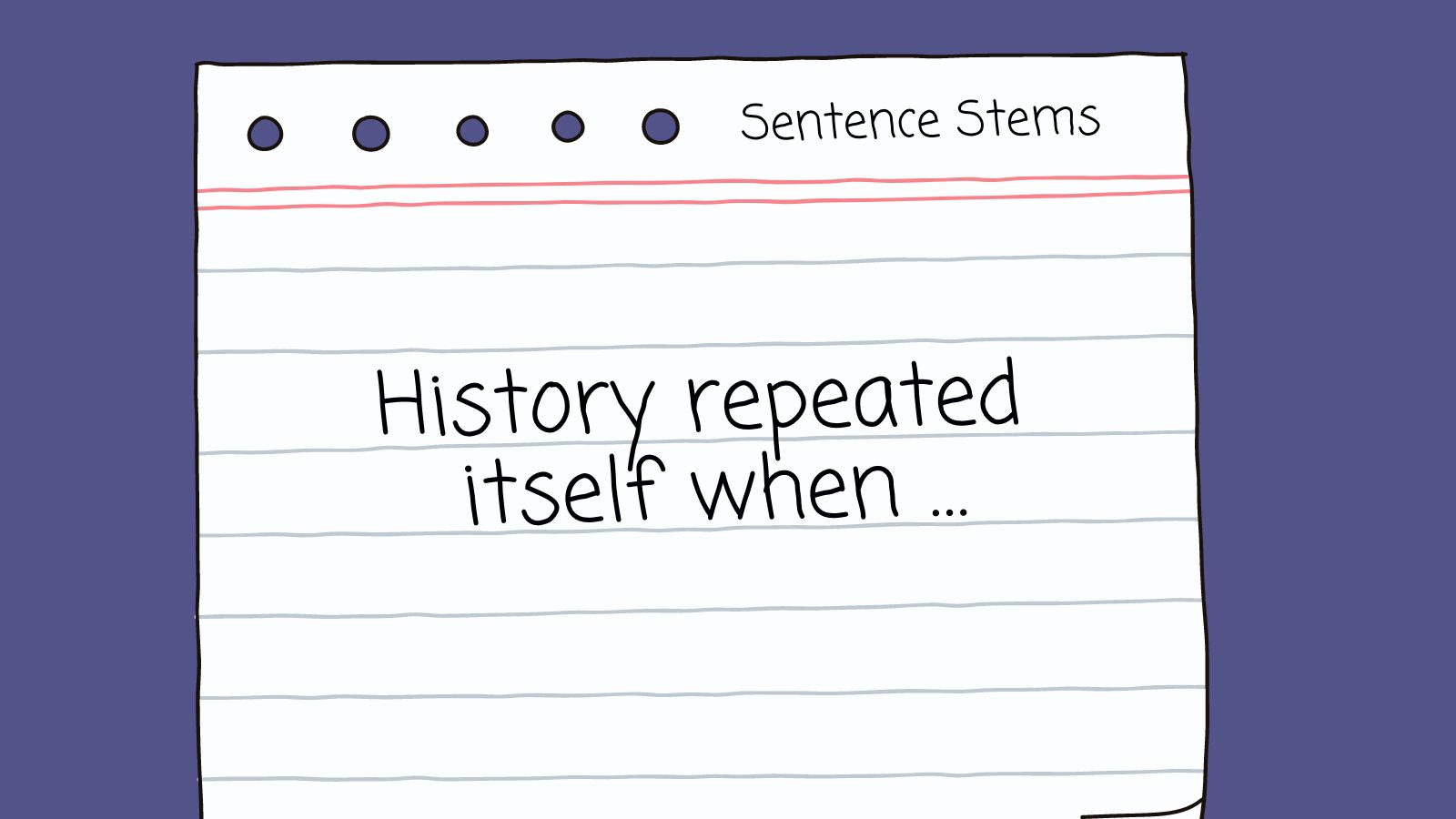
Some students have no trouble expressing their thoughts, whether verbally or in writing. Others, though, need some help to get started. Sentence stems—sometimes called sentence starters, sentence frames, or thinking stems—help them do just that. Here’s how they work.
How To Use Sentence Stems
Provide all students with a list of sentence stems they can use during discussions or when they’re writing. For fluent writers or speakers, these stems may not be necessary, but they’re always helpful to have on hand. You can give kids a handout, or post an anchor chart for them to refer back to.
Be sure to model them for kids, showing how to fill in the blanks. Practice both out loud and in writing, providing your own example and then asking for their take. It’s OK if they simply fill in the blanks when they first start using these stems. But over time, students should use them more as a jumping-off point, to delve deeper into the topic.
Tip: Don’t require sentence stems if students don’t need them. Some kids will do just fine having a discussion on their own, or getting started on a writing assignment. But encourage others to use them as much as they need to. Eventually, these stems will become automatic, giving students tools to help them become better communicators.
Language Arts Sentence Stems
- The author used this technique because …
- The narrator is reliable/unreliable because …
- Characters in this story started out … but changed to …
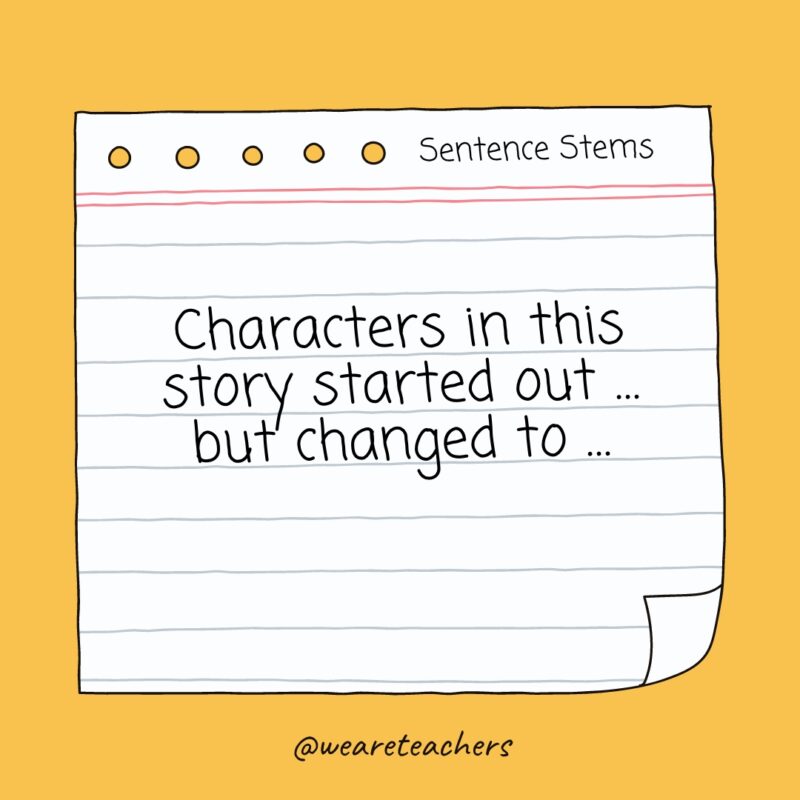
- The theme of this story is … which is shown by …
- This story reminds me of …
- If could change the end of this story, I would …
- I liked/disliked this character because …
- This story made me feel … when …
- [Character] and [character] are alike/different because …
- My favorite part was …
- The author wants us to believe …
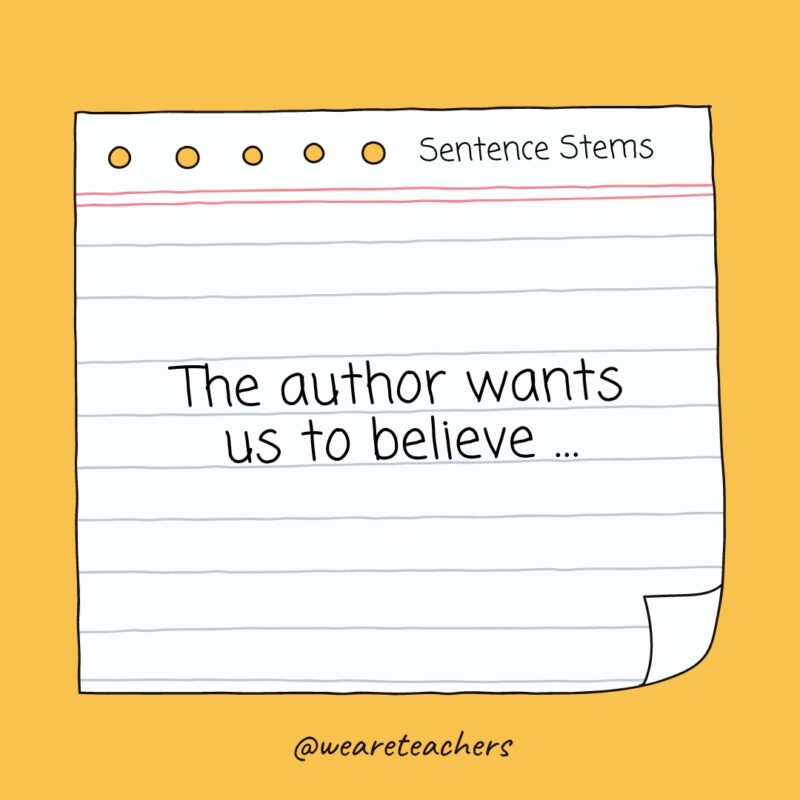
- Based on this text …
- The author proves their point by saying …
- I didn’t understand why …
- When I read … what I pictured in my head was …
Social Studies Sentence Stems
- These events are alike/different because …
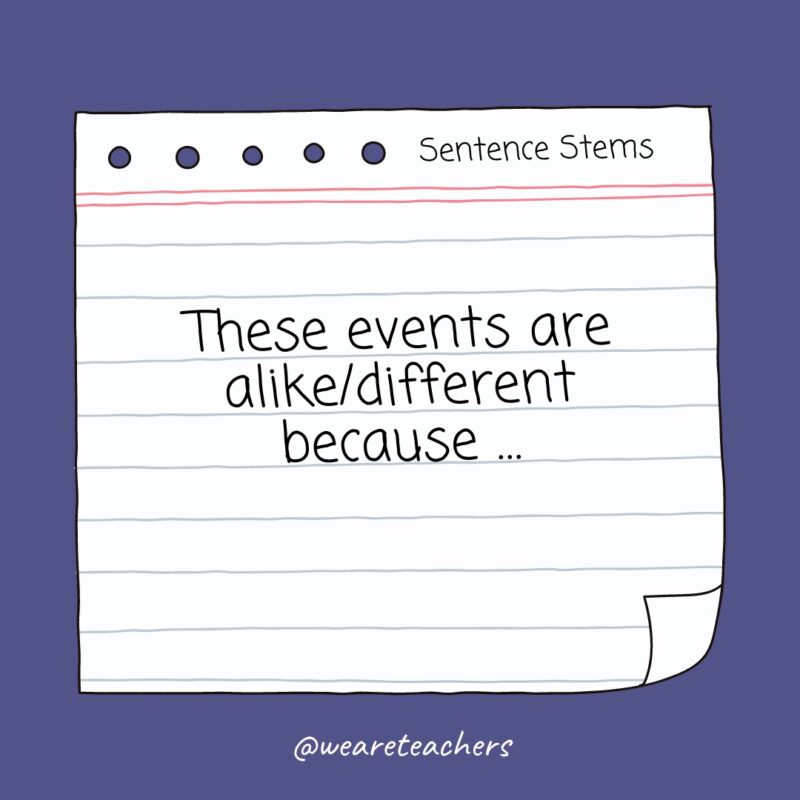
- If this happened today …
- If I lived then, I would have …
- This happened because …
- The effects of this were …
- I agree/disagree with … because …
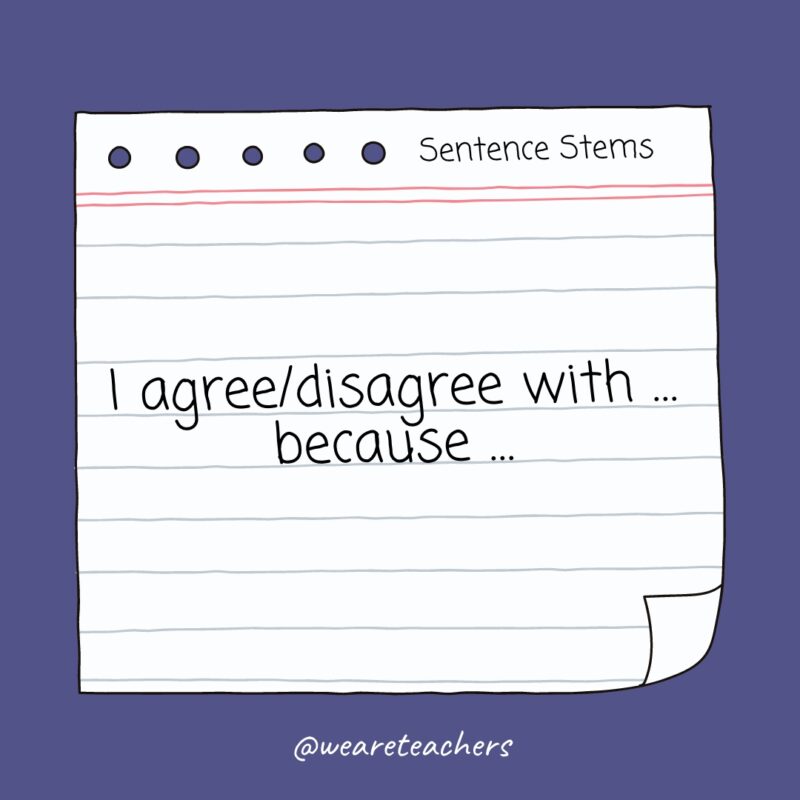
- I was surprised to learn …
- I don’t understand why …
- History repeated itself when …
- I feel inspired by …
Science Sentence Stems
- The data shows …
- This experiment proved … because …
- I believe … will happen because …
- I expect to see …
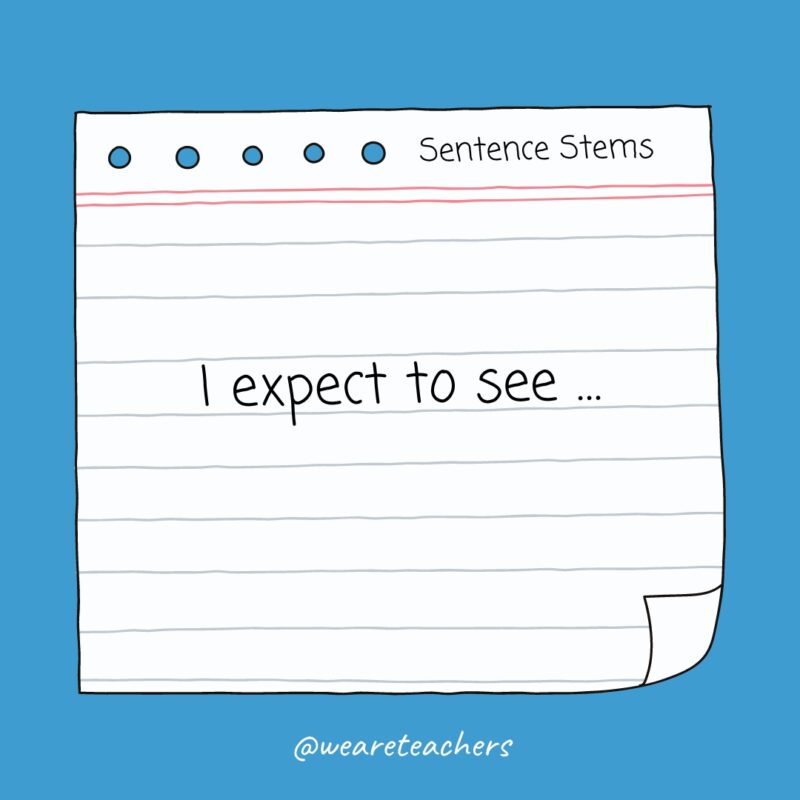
- The cause of this is …
- The effect of this is …
- I was surprised when …
- We can find out by …
- We could change the outcome by …
- I discovered …
- The pattern I observed was …
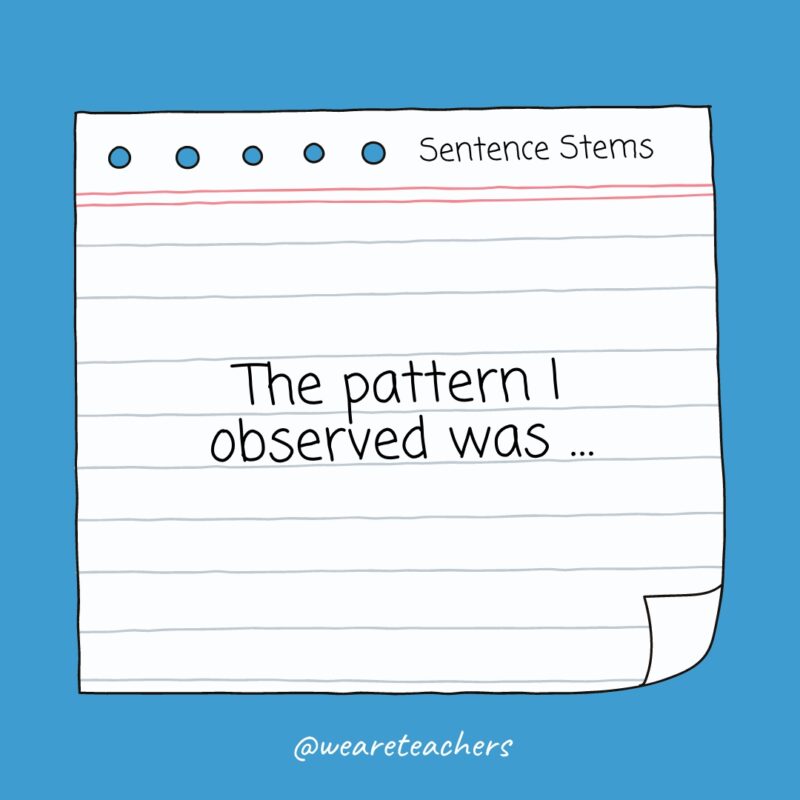
- My results show …
- I predict … because …
- The experiment was a success/failure because …
Math Sentence Stems
- To solve this problem, I need to …
- The important information is …
- I can check my work by …
- Another way to solve this problem is …
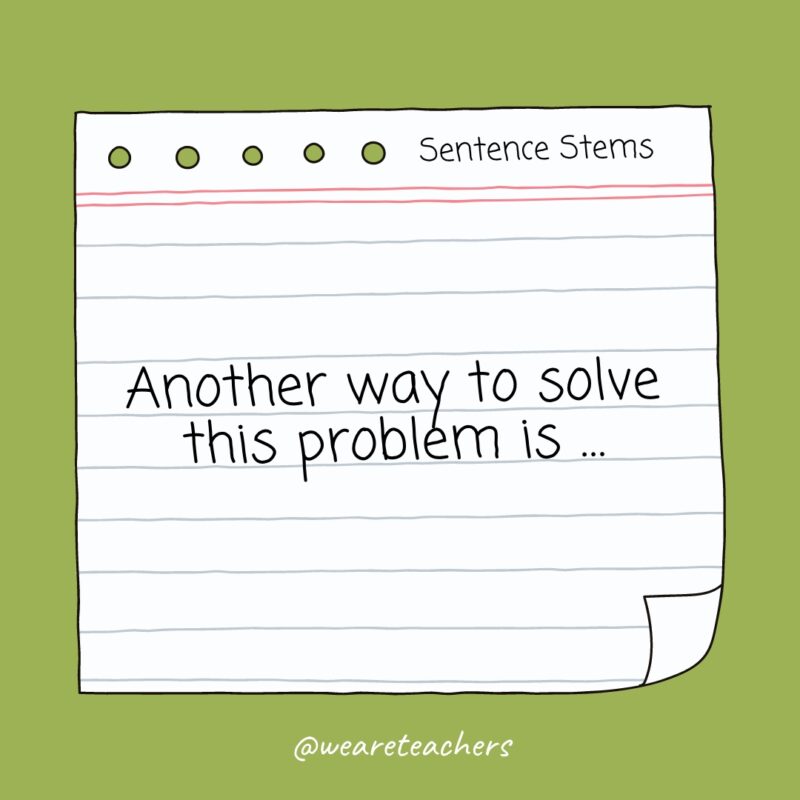
- First I … Then I … Finally I …
- I found the answer by …
- This problem reminded me of …
- I can use this skill in real life when …
- I got the wrong answer because …
- This solution makes/doesn’t make sense because …
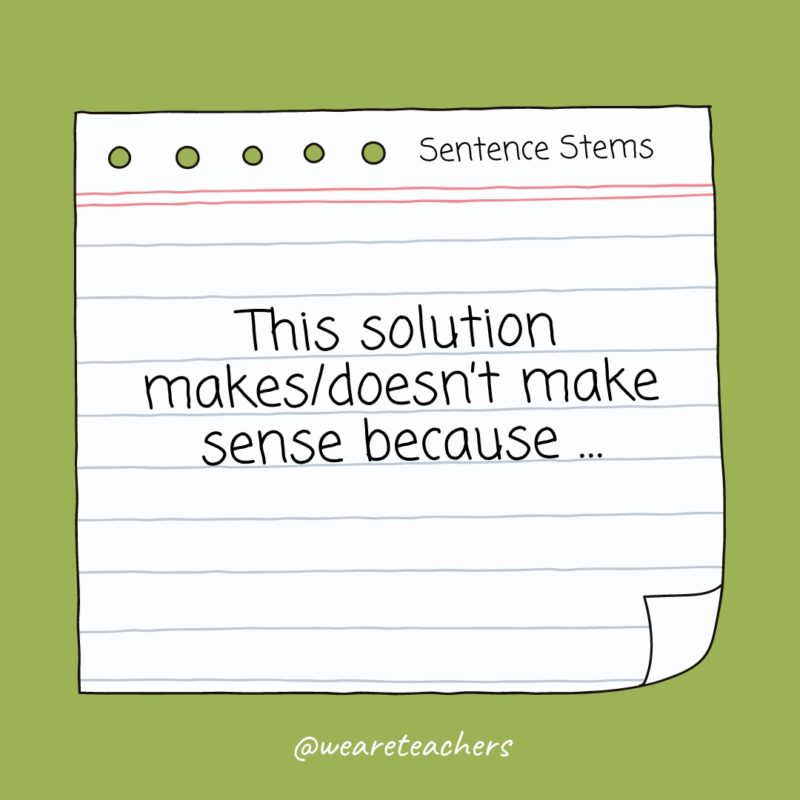
Discussion Sentence Stems
- When you said … I felt …
- I used to think … Now I think …
- I feel … when …
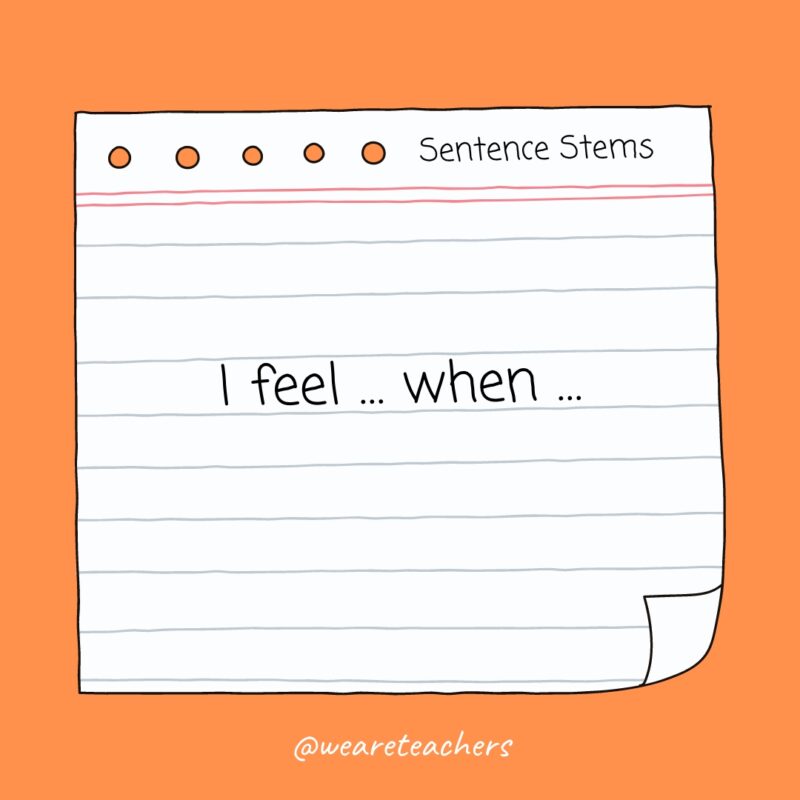
- We are alike/different because …
- I respect your opinion, but I disagree because …
- From my point of view …
- What I’m hearing you say is …
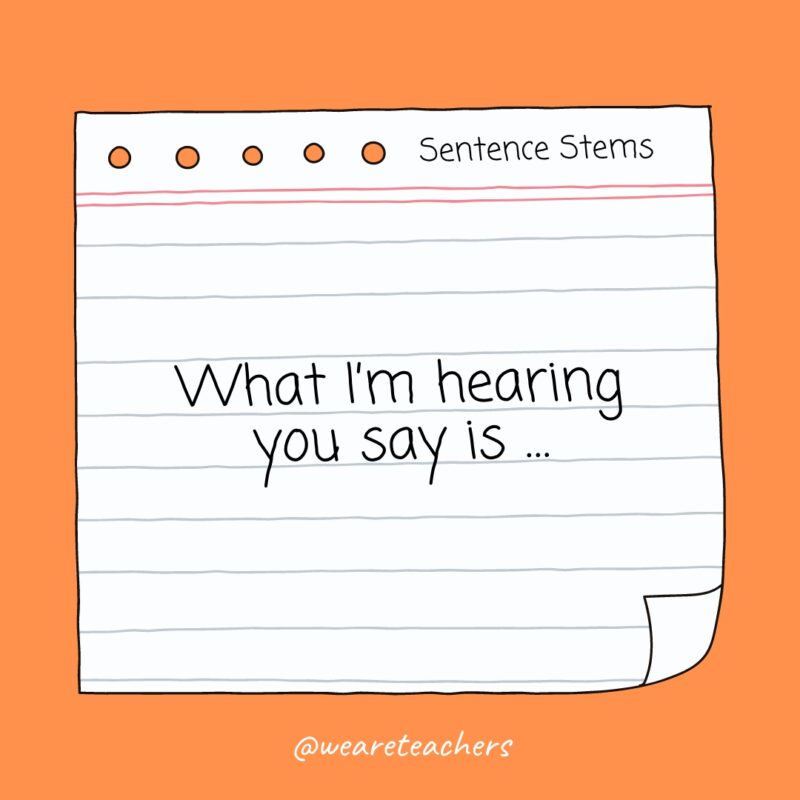
- If that happened to me, I would …
- What if we …
- I need some help with …
How do you use sentence stems? Come share your thoughts and ask for advice in the WeAreTeachers HELPLINE group on Facebook .
Plus, 40 must-have anchor charts for teaching writing of all kinds ., you might also like.

18 Smart Instructional Scaffolding Examples for Every Classroom
Tips and ideas for teachers and school leaders. Continue Reading
Copyright © 2024. All rights reserved. 5335 Gate Parkway, Jacksonville, FL 32256

- Why Choose Us
- Vision and Mission
- Hire Writers
- How it Works
Sentence Starters for Essays: A Complete Guide on Its Use and Tips
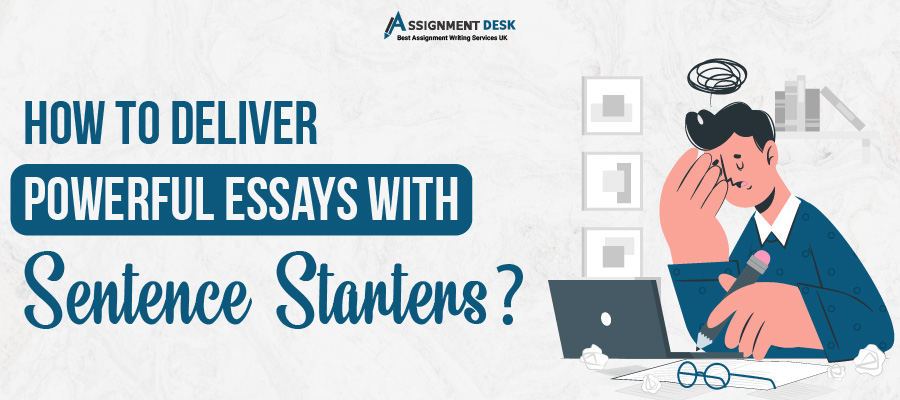
Table Of Contents
What is a sentence starter, importance of sentence starters for essay, are transition words and sentence starters the same, tips on how to start a sentence in an essay, how to find a good opening sentence for essay, different types of sentence starters to match different requirements, need help with sentence starters hire our experts.
Studying in high school or college is surely one of the best phases of everyone's life. But even this beautiful phase has its own challenges. Writing essays for school and different academic writing tasks is a bit challenging for students.
It has been loudly declared by most high school students that pick suitable sentence starters for essays . This is the toughest moment they face whenever they think about writing something.
The jinx is over now. This blog will introduce many wonderful ideas about how and what sentence starter for essay to pick to start with. We have segregated the whole blog into different subcategories so that you don't miss anything important when it comes to the wise use of good essay sentence starters .
Even if this guide is not enough for you and you are still struggling hard to compose your essays, hiring a professional service can save you time and your grades. Such services are deliberately kept affordable to help out a large number of students. When you are ready to pay for essay , contacting us is best because their work ethics are unparalleled. Now, let's begin and learn what university essay sentence starters are.
Need Personalised Assistance from Our Experts?
Share Your Requirements via Whatsapp!
Generally, a essay writing sentence starters can be defined as a set of words or phrases that we put at the beginning of a sentence. A sentence starter gives a strong indication of what your essay/paragraph is going to focus on and what type of essay it is.
Essay sentence openers are not at all necessary to be always sensational. It is best to keep it relevant and interesting to grab the attention of the reader. Now you know what it is, move on to the next section to learn the importance of sentence starters essay .
An essay should always have a vision and clarity as it explains or introduces something to the readers. How you open the door for them to your article plays a critical role in keeping their interest intact till the end.
A set of good essay sentence starters comes under the most crucial components of any write-up. They help the writer to set the stage for readers with a clue about what to expect next. Essay sentence openers hold the power to bring cohesion to lengthy pieces of writing, especially academic essays.
You can also put essay opening sentence/phrases to good use by using them to make a smooth transition from one paragraph to another. If you put the essay introduction sentence starters at a paragraph's beginning, it often the sharp shifts within your article.
The importance of sentence starters in any sort of writing cannot be overlooked. Getting help from essay writing service providers can assist students in making the best of it out of them. But, before that, you must know whether transition words and sentence starters for essays are the same or not.
Wondering What Sentence Starters to Use in an Essay?
Reach out to Our Experts and Let them Resolve All Your Doubts and Queries
If we put it simply, transition words are the group of words or phrases that helps the writer to connect the thoughts or ideas between two sentences or paragraphs. This makes things less abrupt and more fluid.
Transition words can be used as good sentence starters for essays and vice versa. But not all transition words can fit the category of sentence starters.
If you choose professional writing help to make your essay outstanding, the service providers usually assign that task to an efficient UK essays writer. Such writers know exactly how to blend the right amount of transitional words and sentence starters.
A Few Useful Transition Words as University Essay Sentence Starters
To help you in making writing more creative yet tightly knitted pieces, here is a list of some useful transition words:
- Alternatively
- At this time
- Consequently
- In effect of
- In contrast
- In other words
These transition words are quite simple to try as an opening sentence for essay or paragraph. They don't take much of your effort to improve your writing style.
Till now, you just get familiar with sentence starters for essays . In the upcoming section, you will know some tips to use it properly in essays.
Also Read: A Guide to Double Spaced Essay (Process, Significance, Tips)
Writing an essay is not just jotting down your ideas and expressing them in words. There is more to it, particularly when you are writing something related to your academics. Be careful with the words to use in an essay . The most difficult part remains the introductory part. So, take a look at the following tips before you start the essay:
- Make a rough draft of your thoughts, ideas and how you want to execute that in writing.
- Choose an interesting title for your essay.
- List down a few good essay introduction sentence starters. Read carefully through your essay requirements to understand what is expected from your essay
- Organise your points in a logical order
- Keep sentences together that make sense with each other in a paragraph
- Think about a way to grab the attention of the reader
- Your introduction paragraph should say what the article is going to be about
- Never skip the conclusion part
- You can use previously written essay examples as reference
The quality of your essay's first paragraph heavily determines the whole writing's success. You must start the first paragraph interestingly so that reader gets hooked. A good opening sentence for essay can do that for you.
Here is how to pick a stimulating essay opening sentence:
- Your language should be clear and strong
- You can add some element of surprise
- Find something that can help you to pop up the main topic
- Don't use phrases like "I think" or "It may be". Instead, you may write "I believe" or "I am sure that", etc.
You can take the help of a professional essay writer to process essay for you. Such services are quite affordable.
Are You Looking for Reliable Essay Writing Help?
Get an Excellent Submission on Any Complex Topic from Our Writers
In this section, we have categorised a hoard of sentence starters for essays to serve different purposes. We hope these categories will help everyone, including students, to write more powerful essays.
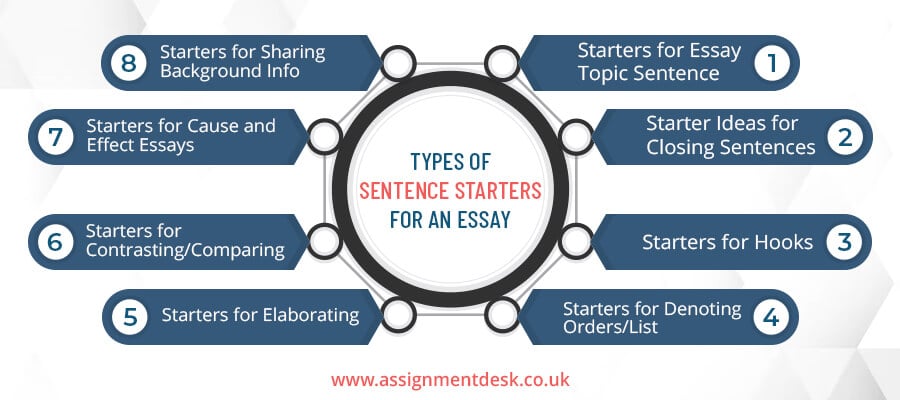
Starters for Writing Essay Topic Sentence
A topic sentence sets the stage for the reader by stating the subject of the essay in the upcoming paragraphs. Here is the list of topic sentences to give you a clue about how to start a sentence in an essay introduction.
- This paper aims to…
- Today's topic covered in the paper includes…
- This write-up focuses on…
- One reason why…
- The first thing to note is…
Sentence Starter Ideas for Closing Sentences
Just like a captivating introduction, it is equally crucial to close your essay with the right tone. You can choose from the following phrases to draft the final sentence while looking for sentence starters for university essays.
- In light of what we have discussed…
- Put simply…
- Pieces of evidence and facts suggest that…
- As conclusion…
- To conclude…
- To sum it up…
- Taking everything into account…
- In the final analysis…
- On the whole…
Starters for Hooks
To grab the attention of readers, you can use anything you like from the below list of essay sentence starters:
- Just as… [for an analogy]
- Do you know that…[for a fact]
- As per… [for a statistic]
Starters for Denoting Orders/List
Here comes the group of starters for listing ideas:
- The second…
Also Read: Report Vs Essay - All the Major Differences You Need to Know!
Starters for Elaborating
Looking for an essay sentence starter to elaborate on an idea? Take a look at the below-mentioned phrases:
- In other words…
- For example,
- To elaborate…
- Another way to put it would be…
- In simple words...
Starters for Contrasting/Comparing
If you need sentence starters for writing essays for contrasting and comparing two or more things, here are some good ideas:
- The flip side is…
- Rather than…
- Apart from…
- In contrast to…
- Compared to…
- On the other hand…
- Even though…
Starters for Cause and Effect Essays
Here are some wonderful ways to start a sentence in an essay to describe the reason or effect of something:
- That's why…
- In that case…
- This being the scenario…
- So that's why…
- Subsequently…
Starters for Sharing Background Info
Following are the good sentence starters for essays for giving brief background information in the paper:
- As everyone knows…
- In this age of…
- As mentioned previously…
Writing a good essay is not just about conveying your thoughts. You should make it intriguing to keep the reader glued to the last word. The sentence starters for essays are great tools for making the article more engaging. For any kind of professional help with writing academic essays, Assignment Desk is always ready to assist you.
Try Before You Buy !
Get Free PDF Link Directly to your WhatsApp !

Great!! Sumsa Free PDF Template has been delivered on your WhatsApp Number.
Share Your Requirements Now for Customized Solutions.
Delivered on-time or your money back
Our Services
- Assignment Writing Service
- Essay Writing Help
- Dissertation Writing Service
- Coursework Writing Service
- Proofreading & Editing Service
- Online Exam Help
- Term paper writing service
- Ghost Writing Service
- Case Study Writing Service
- Research Paper Writing Service
- Personal Statement Writing Service
- Resume Writing Service
- Report Writing Service
To Make Your Work Original
Check your work against paraphrasing & get a free Plagiarism report!
Check your work against plagiarism & get a free Plagiarism report!
Quick and Simple Tool to Generate Dissertation Outline Instantly
Get citations & references in your document in the desired style!
Make your content free of errors in just a few clicks for free!
Generate plagiarism-free essays as per your topic’s requirement!
Generate a Compelling Thesis Statement and Impress Your Professor
FREE Features
- Topic Creation USD 3.87 FREE
- Outline USD 9.33 FREE
- Unlimited Revisions USD 20.67 FREE
- Editing/Proofreading USD 28 FREE
- Formatting USD 8 FREE
- Bibliography USD 7.33 FREE
Get all these features for
USD 80.67 FREE
RELATED BLOGS

An Ultimate List of 100+ Latest Exploratory Essay Topics
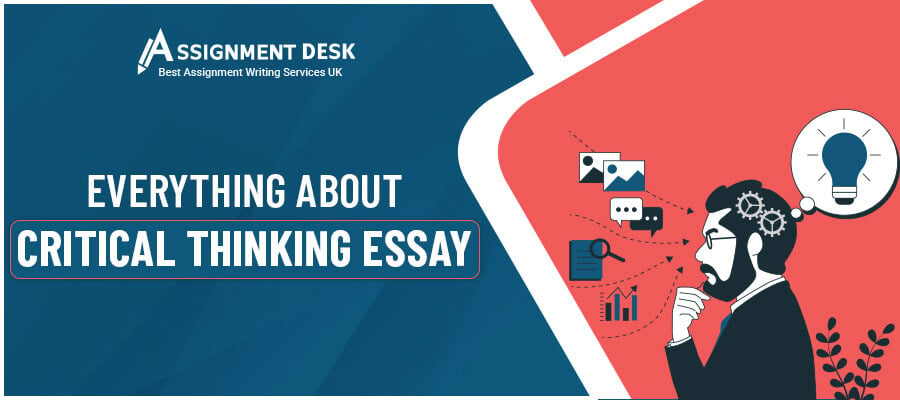
Critical Thinking Essay: Meaning, Importance, Examples & How to Write
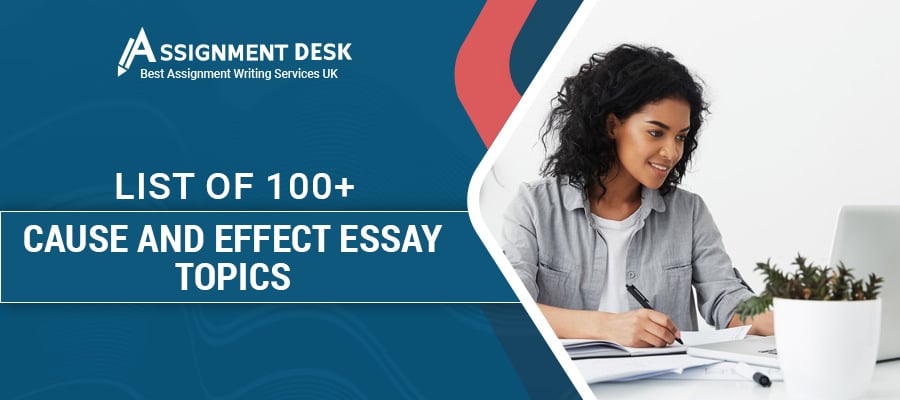
100+ Remarkable Cause and Effect Essay Topics from Diverse Fields
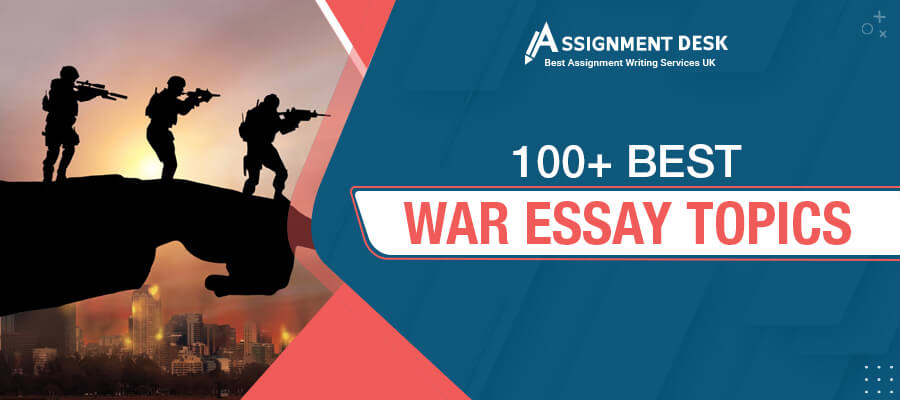
List of 100+ Unique War Essay Topics that You Must Consider
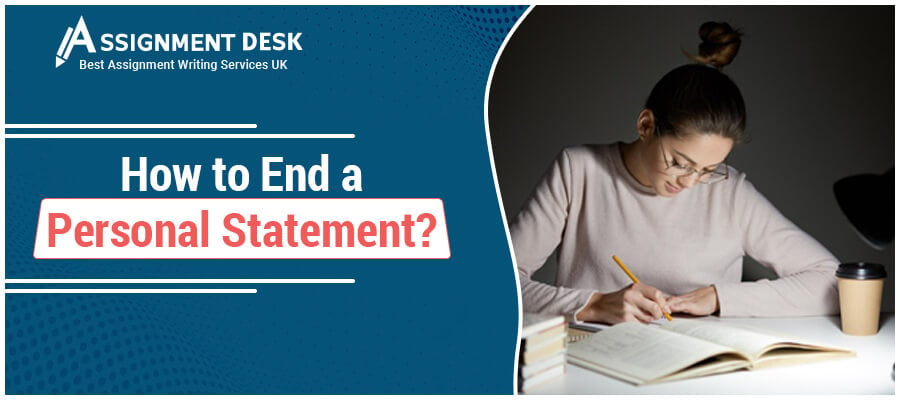
How to End a Personal Statement to Make an Impact?
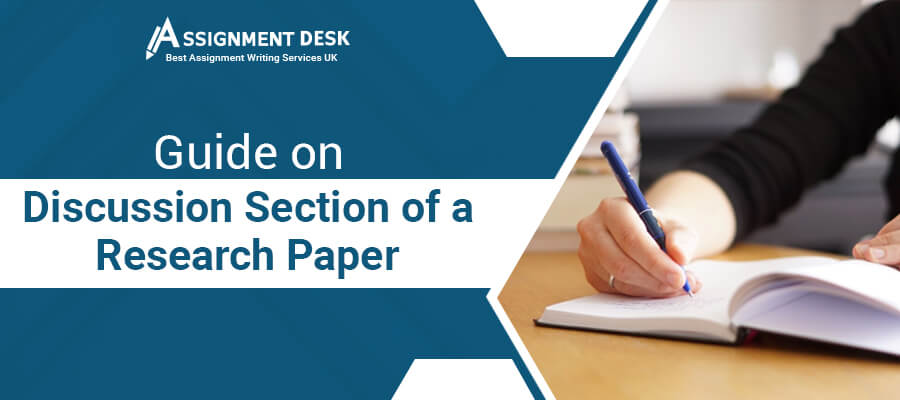
How to Write a Quality Discussion Section of a Research Paper?
Professional assignment writers.
Choose a writer for your task among hundreds of professionals

Please rotate your device
We don't support landscape mode yet. Please go back to portrait mode for the best experience
We use cookies to ensure that we give you the best experience on our website. If you continue to use this site we will assume that you are happy with it. Know more
Calculate the Price
Professional Academic Help at Pocket-Friendly Prices!
Estimated Price
Limited Time Offer
Exclusive Library Membership + FREE Wallet Balance
1 Month Access !
5000 Student Samples
10,000 Answers by Experts
Get $300 Now
The English Classroom
A GUIDE FOR PRESERVICE AND GRADUATE TEACHERS
Formulating Ideas: Sentence Starters
The situation.
Your students find it difficult to begin their writing.
The Solution
Sentence starters are a necessary part of the writing process and getting students to be success with showcasing their ideas.
Some students may find it difficult to generate the ideas that have in their mind into a response on the page. While some students can articulate themselves verbally, this does not always translate well to their work.
To respond to this struggle, students should be provided with a sentence starter to get the proverbial ball rolling.
A sentence starter, or stem, is merely the first half of a sentence that students need to finish themselves. It gives students the appropriate vocabulary to be independent with their writing.
At the start of my teaching career, I thought this was akin to giving students the answer; however, I now understand that it is about providing students with a starting point that they need to finish.
Consider the following question:
Based on your understanding of the first 2 stanzas of The Raven , what is this poem about?
Here are a number of sentence starters that you may choose to use and record on the whiteboard for students.
- Edgar Allan Poe’s The Raven is about…
- In the first stanza…
- In the second stanza…
You might like to generate some generic sentence starters for different types of thinking, such as we explored in Bloom’s Taxonomy . Check out this one that I found on Pinterest, which might be great to have on the wall in the classroom:
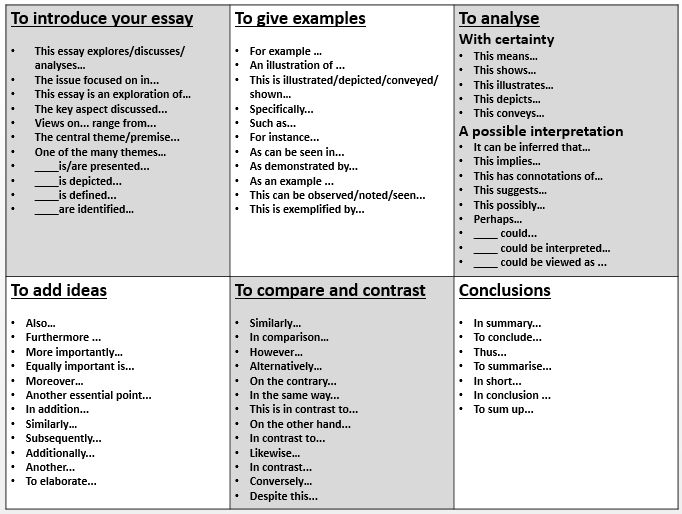
Share this:
Published by The English Classroom
View all posts by The English Classroom
4 thoughts on “ Formulating Ideas: Sentence Starters ”
- Pingback: Chunking | Cosmik Egg
- Pingback: Retrieval Charts | Cosmik Egg
- Pingback: Types of Paragraph Structures | Cosmik Egg
- Pingback: Values and Attitudes in The Fault in Our Stars | The English Classroom
Leave a comment Cancel reply

- Already have a WordPress.com account? Log in now.
- Subscribe Subscribed
- Copy shortlink
- Report this content
- View post in Reader
- Manage subscriptions
- Collapse this bar
- AI Content Shield
- AI KW Research
- AI Assistant
- SEO Optimizer
- AI KW Clustering
- Customer reviews
- The NLO Revolution
- Press Center
- Help Center
- Content Resources
- Facebook Group
Sentence Starters Made Easy for Better Essays
Table of Contents
The first sentence of an essay is a sentence starter. They must intrigue the reader enough to read further into the paper without being too wordy.
Generally, they should introduce the topic and give the reader the main idea of the paper at a glance. It also helps establish the tone and direction of the essay.
Without them, writing can become fragmented and disjointed, making reading difficult. However, it is not always clear which ones to include and when.
In this article, we provide sentence starters that you can use in your writing, separated into categories for simple references. Let’s get started!

What Is a Sentence Starter?
Sentence starters are the words or phrases that introduce the remainder of the sentence and are generally separated by commas. Sentence-beginning words are crucial in writing. They introduce the subject of the sentence so that the reader knows what to anticipate.
The first sentence of an essay are vital to the cohesion of lengthy academic writing works. Because each sentence effectively has its own theme, these compositions frequently and sometimes abruptly move from point to point.
Sentence starters facilitate the reader’s comprehension by softening abrupt transitions and introducing the next topic.
This rule also applies to paragraphs that bounce from subject to subject. Paragraph starters provide an organizational signpost via introductory sentence starters to bridge the gap between themes.
Although prevalent in fiction, sentence starters are most effective when writing nonfiction, especially essays.
In contrast to fiction, nonfiction employs a range of facts that serve as sentence starters for the reader. In other words, if you believe nonfiction to be dull, imagine if it were simply a list of facts!
When Should You Employ Sentence Starters?
Sentence starters aren’t required for all sentences. In fact, their overuse can be distracting. These are some instances where a sentence starter is most effective:
- When it’s hard to see how one sentence fits with the others.
- You’re bringing up a new idea, like at the start of an essay or a paragraph.
- Giving a summary or conclusion, like at the end of an essay.
- Want to put more attention on a certain sentence or point.
- You need to write a hook to get people interested.
- The sentence needs some background information or context to make sense.
There is no hard and fast rule for when to utilize and when to avoid sentence starters. If you are having difficulty deciding, consider revisiting your past few paragraphs and evaluating their flow.
There is no need for sentence starters if your sentence flows well. If something feels odd, out of place, or absent, try adding one to see if it helps.
Below you will discover samples of context-appropriate phrase beginnings.
First Sentence of an Essay (Topic Sentences)
Topic sentences introduce the topic of the paragraph or the entire content to enable readers know what to expect.
- This paper discusses …
- In this paper . . .
- Here, we discuss . . .
- Below, you will find . . .
Sequences or Lists: Sentence Starters
Sentence starters come particularly handy when writing sets of instructions or explaining a succession of events. These components aren’t always related in obvious ways. Sentence openers connect them and put them in the proper order, so your reader can organize them in their thoughts.
- First . . ., Second . . ., Third . . ., etc.
- Subsequently . . .
- After that . . .
Comparisons: Sentence Starters
To show that two items are similar or linked, use sentence starters.
- Similarly . . .
- I n the same way . . .
- Likewise . . .
- Again . . .
Elaboration or Adding New Points
When a single sentence is insufficient to properly express your idea, including sentence starters to subsequent sentences can connect them.
- Additionally . . .
- Moreover . . .
- Furthermore . . .
- Also . . .
Introducing Examples
For essays, you should support your claims with proof. Sentence openers facilitate the shift from describing the large picture to illustrating the application of these principles in the real world.
- For example . . .
- For instance . . .
- This is evidenced by . . .
- Consider the [case/example] of . . .
Contrasts and Abrupt Transitions
Sentence starters are most effective when switching topics abruptly. The writing seems abrupt and disjointed without them, so utilize them to keep your reader on track, especially when comparing topics.
- Although . . .
- On the other hand . . .
- In contrast . . .
- Despite that . . ..
To Establish Cause and Effect
Commonly, two sentences are used to describe a cause-and-effect relationship, such as something causing something else to occur. This link can be clarified by using sentence starters to show the distinction between the cause and effect.
- As a result . . .
- Accordingly . . .
- Therefore . . . .
- That is why . . .
Emphasis: Sentence Starters
In other instances, sentence beginnings are not required, but they serve to emphasize a point. Reserve these for the sentences that you want your audience to remember most.
- Above all . . .
- As usual . . .
- Certainly . . .
- Generally speaking . . .
Starters for References
If you are crediting someone else’s concept, such as in a research paper, include the attribution in the first words of the phrase. Use these phrase openers before quoting or discussing an idea from another source.
- According to . . .
- Based on the findings of . . .
- As explained by . . .
- With regards to . . .
Generally Accepted Concepts (Historicals)
Some sentences lack meaning when removed from their context. This could be a popular, mainstream notion that is unknown to the reader, or some historical context that is not well known. Sentence starters can provide background in these cases without veering off topic.
- Traditionally . . .
- Historically . . .
- Initially . . .
- Until now . . .
To Show Uncertainty or Doubt
If you are writing about facts, your audience will assume that everything you write is true. In circumstances where something is unproven or unknown, tell your readers that doubt exists so as not to mislead them.
- Perhaps . . .
- Although not proven . . .
- Arguably . . .
- While debatable . . .
Conclusion and Summaries
Because they do not convey fresh information, conclusions and summaries always behave differently than other phrases and paragraphs.
Sentence starters can signal to the reader that you’re about to “close things up,” so they don’t expect any fresh points or proof.
- In summary . . .
- To summarize . . .
- In conclusion . . .
- To wrap things up . . .
A sentence starter is a brief word or phrase to help the reader transition . Sentence starters are commonly used in written texts, blog posts, reports, and essays.
If you want your sentence starters to stand out from the crowd, avoid common words. Common words such as “I,” “am,” and “this” should be avoided. Always use sentences that are familiar to most readers.

Abir Ghenaiet
Abir is a data analyst and researcher. Among her interests are artificial intelligence, machine learning, and natural language processing. As a humanitarian and educator, she actively supports women in tech and promotes diversity.
Explore All Hook Writing Articles
Guide to writing an interesting expository essay introduction.
A good expository essay begins with an introduction that piques the interest of the reader. The expository essay introduction is…
- Hook Writing
Discover the Top Creative Story Introduction Examples
Are you an aspiring author dreaming of becoming the likes of Stephen King or Suzanne Collins? Would you like to…
Creative and Powerful Sentence Starters for Essays
It can’t be said enough, first impressions matter. And it goes the same for essays because your starter sentences will…
Most Important Parts of an Essay Introduction
The introduction is often one of the most important sections in a paper. It creates a sense of what the…
7 Effective Ways to Start a Sentence
There are different ways to start a sentence and convey your message effectively to the readers. Being aware of the…
Six Social Media Hooks to Boost Engagement
To get the most out of your marketing strategy, you should consider using social media hooks to improve your engagement…

IMAGES
VIDEO
COMMENTS
Learn how to use sentence starters to connect ideas, transition paragraphs, and improve your writing. Find examples of different types of sentence starters for various purposes and situations.
Learn how to use transitions, hooks, and other sentence starters to write better essays. Find examples, tips, and a list of 25 useful transitional words and phrases.
In essay writing, sentence starters for essays are the secret sauce that adds flavor to your content. They are the transition phrases that guide your reader from one idea to the next, ensuring a smooth journey through your thoughts. When it comes to body paragraphs, these starters play a pivotal role in maintaining the flow and coherence of ...
Sentence starters, also known as transition words or phrases, are vital tools for essay writing. They play a key role in formulating an interesting and well-written introduction, providing smooth transitions between sentences and paragraphs, and writing a proper conclusion that summarizes the main points covered. Sentence starters are one of the essential tools of a skilled writer.
Sentence Starters! When writing an essay in the English language, it is very important that your writing flows and sounds good.There are a variety of ways in which you can do this, one such way is by using sentence starters. In this article, we are going to be looking at some sentence starters which you can use as a way of creating much more interesting and engaging written work in English.
so i think that there should be more expansion so we can tell the reader a bit more about what is happening. i like his book. Sentence Starters! Here you will find a useful list of common sentence starters that you can use in a discussion as well as in essay writing. Learn these.
In conclusion, sentence starters serve as valuable tools in academic writing, enabling you to structure your thoughts, enhance clarity, and guide readers through your research essays. Use them in abundance yet carefully, as they can enhance your quality of writing significantly. Paperpal is a comprehensive AI writing toolkit that helps students ...
Sentence starters can be very useful in persuasive writing because they can help you introduce your argument and provide evidence to support it. Some effective sentence starters for persuasive writing include "it is clear that," "research shows that," or "experts agree that.". These types of sentence starters can help you establish ...
4. That is to say. Usage: "That is" and "that is to say" can be used to add further detail to your explanation, or to be more precise. Example: "Whales are mammals. That is to say, they must breathe air.". 5. To that end. Usage: Use "to that end" or "to this end" in a similar way to "in order to" or "so".
To access a large on-line academic writing phrase bank go HERE Sentence starters, transitional and other useful words Adapted from the following source Manalo. E., Wont-Toi, G., & Bartlett-Trafford, J. (2009). The business of writing: Written communication skills for business students (3rd ed.). Auckland: Pearson Education New Zealand
Tips for Using Transition Words and Phrases. 1. Use a variety of transition words, not the same one. 2. Put a comma after the transition word. 3. Put the subject of the sentence after the comma. Choosing the right word to start, end, and transition topics can make or break an essay.
Table of contents. Step 1: Hook your reader. Step 2: Give background information. Step 3: Present your thesis statement. Step 4: Map your essay's structure. Step 5: Check and revise. More examples of essay introductions. Other interesting articles. Frequently asked questions about the essay introduction.
To help you make proper and effective use of sentence starters, here is a list of the kind of situations where the usage of a sentence starter will definitely prove beneficial. The first instance would be when you are introducing a new thought or idea; for example, the very first sentence that is used to begin a paragraph, an essay, a report or ...
There are many different ways to start a story or essay. Introduction sentence starters can help students learn about different techniques and experiment with different styles. To help students engage the reader. A strong introduction is essential for engaging the reader and keeping them interested in the text. Introduction sentence starters ...
Opinions can be powerful sentence starters for essays because they allow the reader to start thinking about the discussed issue immediately. When written effectively and in the form of an essay, opinions can lead readers to think about the statement and form their own opinions. Everybody should act on climate change now.
Essay sentence starters have the right to bring cohesion to long writing pieces, especially in academic essays. You can use good sentence starters in an essay to present an amazing transition from one paragraph to another. If you use the essay sentence introduction sentence starters at the start of the paragraph, it mostly enriches the quality ...
View examples of essay starters, including body paragraph starters and sentence starters for essays. Learn ways to start a paragraph. Updated: 11/21/2023
Phrases to organize a list or sequence in writing. Sentence starters are helpful for lists of instructions or explaining a series of events. These items may not be related in obvious ways, but sentence starters link them together and in the correct order so that the reader can understand them properly. "First . . ., Second . . ., Third ...
Others, though, need some help to get started. Sentence stems—sometimes called sentence starters, sentence frames, or thinking stems—help them do just that. Here's how they work. How To Use Sentence Stems. Provide all students with a list of sentence stems they can use during discussions or when they're writing.
Generally, a essay writing sentence starters can be defined as a set of words or phrases that we put at the beginning of a sentence. A sentence starter gives a strong indication of what your essay/paragraph is going to focus on and what type of essay it is. Essay sentence openers are not at all necessary to be always sensational.
Sentence starters are a necessary part of the writing process and getting students to be success with showcasing their ideas. Some students may find it difficult to generate the ideas that have in their mind into a response on the page. While some students can articulate themselves verbally, this does not always translate well to their work.
A sentence starter is a brief word or phrase to help the reader transition. Sentence starters are commonly used in written texts, blog posts, reports, and essays. If you want your sentence starters to stand out from the crowd, avoid common words. Common words such as "I," "am," and "this" should be avoided.